- Research Publications
- Student Research Corner
- Seminar/Webinar
- Research Agenda
- Advanced Search
- What is Responsible Tourism?
- Responsible Tourism Strategy
- Responsible Tourism Certification
- Greening and Climate Change
- Community Based Tourism
- The Function of Local Government
- Capacity Building
- Tourism Transport Integration
- Legislative Matters
- Registration Requirements
- Tourist Guide Identification
- Tourist Guides Media Releases
- Tourist Guide Initiatives
- Visitor Information Centres
- Visitor Information Centres Directory
- Tourism Agencies , Department, VIC databases

- Registration Requirements Currently selected
- Presentation

TRAINING OF TOURIST GUIDES
Tourist guides must be trained by accredited training providers for their application for registration to be considered. Tourist guides are responsible for verifying the registration status of the training providers before commencement of training.
A full list of accredited training providers and assessors can be obtained on the Culture Arts, Tourism, Hospitality, and Sport Sector Education and Training Authority (CATHSSETA) website www.cathsseta.org . Information about tourist guiding programmes which are recognised by SAQA can be obtained from the SAQA website www.saqa.org.za . Alternatively, enquiries can be made at the Tourist Guides Registration Offices across Provinces.
Requirements to Register to become a Tourist Guide
Provincial Registrars are appointed in each of the nine provinces to register tourist guides. In order to be registered as a tourist guide in South Africa, a person must meet the following minimum requirements:
- be a South African citizen or be in possession of a valid work permit;
- must have undergone training with a CATHSSETA -accredited training provider or any other accredited institution which offers programes recognized by SAQA ;
- be in possession of a valid first aid certificate from institution recognized by Department of Labour;
- pay a registration fee of R240 (Renewable every 3 years)
- submit 4 passport-size photos;
- must submit a completed and signed registration form and the code of conduct and ethics upon registration.
Tourist Guide Registrars
The National Registrar of Tourist Guides, in conjunction with the Provincial Registrars, facilitate maintenance of the Central Tourist Guides Register as well as the registration of Tourist Guides at provincial level. In this section, browsers will be able to access the contact details of the National and Provincial Registers.
PROVINCIAL REGISTRAR'S CONTACT LIST
Winter is here! Check out the winter wonderlands at these 5 amazing winter destinations in Montana
- Travel Tips
How To Start A Tourism Business
Published: December 12, 2023
Modified: December 28, 2023
by Harlene Byerly
- Plan Your Trip
- Sustainability
Introduction
Welcome to the exciting world of starting a tourism business! Whether you have a passion for adventure, culture, or relaxation, venturing into the tourism industry allows you to share your love for travel with others while creating a profitable business. However, like any entrepreneurial endeavor, starting a tourism business requires careful planning and execution to ensure its success.
In this comprehensive guide, we will walk you through the essential steps involved in starting a tourism business. From conducting thorough research to providing exceptional customer service, we will cover every aspect to help you build a thriving enterprise in the tourism industry.
The tourism industry is flourishing, with millions of people around the world seeking unique travel experiences. By tapping into this demand, you have the opportunity to not only fulfill the desires of adventurous travelers but also contribute to the local economy.
Before diving into the exciting journey of launching your tourism business, it’s important to understand that careful preparation is key to success. With the right strategies and a deep understanding of the industry, you can position yourself as a trusted and sought-after provider of unforgettable travel experiences.
Throughout this guide, we will explore each step in detail, offering valuable insights and tips to help you navigate the challenges and make informed decisions. From researching the tourism industry and defining your niche to securing financing and building a strong team, we will guide you towards establishing a thriving business in the travel industry.
Additionally, we will highlight the critical aspects of developing effective marketing strategies to attract and engage customers, as well as provide insights on providing exceptional customer service to create a loyal client base.
So, if you’re ready to embark on this exciting journey and transform your passion for travel into a successful business, let’s get started with the first step – researching the tourism industry.
Step 1: Researching the Tourism Industry
Before diving headfirst into the world of tourism, it is crucial to conduct thorough research on the industry. Understanding current trends, market demands, and potential challenges will provide you with a solid foundation for building your business.
Begin by analyzing the overall state of the tourism industry, both locally and globally. Look for statistics and reports that provide insights into the number of tourists, popular destinations, and emerging markets. This research will help you identify potential opportunities and gaps in the market that you can capitalize on.
Next, narrow your focus and identify your target audience within the tourism industry. Determine the types of travelers you want to cater to, whether it’s adventure seekers, luxury travelers, budget-conscious backpackers, or eco-conscious tourists. Understanding your target market will enable you to tailor your offerings and marketing strategies to meet their needs and preferences.
Moreover, researching your competition is essential to identify what sets you apart and ensures your unique value proposition. Study other tourism businesses in your area or niche and assess their strengths and weaknesses. This analysis will help you position your business in a way that differentiates you from the competition and attracts your target audience.
When conducting research, don’t forget to consider the current and emerging travel trends. Stay updated on the latest travel patterns, such as eco-tourism, wellness tourism, or experiential travel. Understanding these trends will enable you to align your business offerings with the evolving demands of travelers.
It’s also important to gather information on the legal and regulatory requirements for operating a tourism business. Familiarize yourself with the permits, licenses, and certifications needed to ensure compliance with local and international regulations. This knowledge will save you from potential legal issues and help you establish a trustworthy reputation within the industry.
Finally, consider reaching out to industry experts, local tourism boards, or professional networks for guidance and advice. These resources can provide valuable insights and connect you with key players in the industry.
By investing the time and effort into thorough industry research, you will be equipped with the knowledge needed to make informed decisions and set a strong foundation for your tourism business.
Step 2: Defining Your Niche
Defining your niche is a critical step in starting a successful tourism business. With a multitude of travel options available, identifying and specializing in a specific area will help you stand out from the competition and attract your target audience.
Begin by assessing your own interests and expertise. What aspect of the tourism industry excites you the most? Are you passionate about adventure tourism, cultural immersion, luxury travel, or sustainable eco-tourism? By focusing on an area that aligns with your interests, you are more likely to possess the knowledge and enthusiasm needed to deliver exceptional experiences to your customers.
Next, consider the market demand for your chosen niche. Conduct market research to determine if there is a sufficient number of potential customers interested in the type of travel experiences you plan to offer. Look for gaps or underserved segments within the market that you can target. This way, you can position yourself as a go-to provider for a specific type of travel experience.
It is also crucial to consider your target audience when defining your niche. Who are the individuals or groups most likely to be interested in your offerings? What are their preferences, needs, and budget constraints? By understanding the specific characteristics of your target audience, you can tailor your services and marketing strategies to effectively reach and engage them.
Additionally, consider the geographic scope of your niche. Will you focus on a specific region, country, or even a single destination? By narrowing your geographic focus, you can develop in-depth knowledge about the area, establish strong partnerships with local suppliers, and deliver a more authentic and immersive experience to your customers.
Remember, specializing in a niche doesn’t mean limiting yourself. It simply means becoming an expert in a specific area of the tourism industry. Once you have established a solid foundation and gained recognition in your niche, you can expand your offerings or target additional market segments.
By defining your niche, you will be able to position your tourism business as a unique and specialized provider, standing out from the competition and attracting customers who are specifically seeking the travel experiences you offer.
Step 3: Creating a Business Plan
Creating a comprehensive business plan is essential for the success of your tourism business. A well-crafted business plan serves as a roadmap that outlines your goals, strategies, financial projections, and market analysis.
Start by clarifying the vision and mission of your tourism business. What is the purpose of your business? What unique value will you bring to the market? Clearly defining your mission will guide your decision-making and set the direction for your business.
Next, conduct a thorough market analysis. Identify your target market, assess the competition, and understand the industry trends. Analyze the demand and potential growth opportunities in your niche. This analysis will help you better understand your market position and develop effective strategies to gain a competitive edge.
The financial aspect of your business plan is crucial. Create a detailed budget that includes both startup costs and ongoing expenses. Consider all the necessary investments such as equipment, marketing, staff salaries, and operational costs. Forecast your revenue and profit projections based on market research and realistic assumptions. This financial analysis will help you demonstrate the viability of your business to potential investors or lenders.
Another critical component of your business plan is outlining your marketing and sales strategies. How do you plan to attract and retain customers? Describe your target audience and the specific marketing channels you will use to reach them. Detail your pricing strategies, promotions, and advertising plans. This section should demonstrate your understanding of your target market and showcase how you will position your tourism business in the industry.
Moreover, it’s important to outline your organizational structure and management team. Define the roles and responsibilities of key personnel and highlight their relevant experience and qualifications.
Lastly, create a timeline with specific milestones and goals. Break down your business plan into manageable phases to track your progress and make adjustments if necessary. This timeline will help you stay focused and measure your business’s growth and success.
A well-structured and thought-out business plan is not only essential for your own guidance but also serves as a valuable tool when seeking financing or investors. It demonstrates your professionalism, commitment, and understanding of the tourism industry.
Remember, a business plan is a dynamic document that should evolve as your business grows. Regularly review and update your plan to adapt to market changes and keep your business on track.
Step 4: Securing Financing
Securing the necessary financing is a critical step in turning your tourism business dream into a reality. Starting a tourism business often requires substantial initial investments, and securing funding will enable you to cover startup costs and ensure smooth operations as you establish your presence in the market.
Start by assessing your financial needs. Calculate the estimated costs for equipment, marketing, staff salaries, rent, and other essential expenses. This will give you a clear idea of the amount of financing you require.
Once you have determined how much capital you need, explore the different financing options available to you. Traditional sources of financing include banks, credit unions, and private investors. Prepare a professional and detailed business plan to present to potential lenders or investors, demonstrating the viability and profitability of your tourism business.
If securing a traditional loan is challenging, consider alternative financing methods such as crowdfunding or peer-to-peer lending. These platforms can connect you with individuals or groups interested in supporting your business venture.
Additionally, explore government grants or subsidies that may be available to entrepreneurs in the tourism industry. Many countries and regions offer financial assistance programs specifically designed to support the growth of the tourism sector.
Another option to consider is seeking partnerships or collaborations with existing businesses in the tourism industry. By joining forces with established companies, you can benefit from their expertise, resources, and financial support.
Remember, it’s crucial to present a strong and compelling case to potential financiers. Prepare a detailed financial plan that outlines your projected revenue, expenses, and expected return on investment. Present your business’s unique value proposition, competitive advantage, and growth potential. This will help build confidence and trust with potential investors or lenders.
Lastly, don’t overlook the importance of your personal financial stability. Lenders and investors will often consider your personal credit history and financial situation when evaluating your loan application. Ensure your personal finances are in order and be prepared to provide any necessary documentation.
Securing financing for your tourism business may require persistence and flexibility. Be prepared to explore multiple avenues and adapt your approach as needed. Remember, with the right financing in place, you can focus on growing your business and providing unforgettable travel experiences to your customers.
Step 5: Registering Your Business
Registering your tourism business is a crucial step in establishing its legality and credibility. Proper registration ensures that you comply with local laws and regulations, protects your business name, and allows you to operate with confidence.
The specific registration requirements and process may vary depending on your location and the type of business structure you choose. It is recommended to consult with a legal professional or business advisor familiar with the tourism industry to ensure you complete all necessary steps correctly.
Start by choosing a legal structure for your business. Options may include a sole proprietorship, partnership, limited liability company (LLC), or corporation. Each structure has its advantages and disadvantages, so consider factors such as liability protection, taxation, and ease of operation when making your decision.
Next, choose a name for your business and verify its availability. Conduct a thorough search to ensure that the name you desire is not already in use by another business. Register your chosen business name with the appropriate local or national authorities to secure its exclusive use. This will prevent others from using the same or similar name, protecting your brand identity.
Once you have registered your business name, you may need to obtain certain licenses and permits to legally operate in the tourism industry. The specific requirements vary based on your location and the services you plan to offer. Common permits and licenses in the tourism industry include tourism operator licenses, tour guide certifications, food and beverage permits (if applicable), and transportation permits (if offering transportation services).
In many cases, registering your business also involves obtaining a tax identification number or employer identification number (EIN) from the local tax authorities. This number is necessary for tax purposes and hiring employees, if applicable.
Additionally, it may be beneficial to join local tourism associations or industry organizations. These memberships can provide networking opportunities, access to resources, and credibility to your tourism business.
Remember to keep all registration documents, permits, and licenses in a safe and easily accessible place. Renew any necessary licenses or permits as required to ensure ongoing compliance with regulations.
Registering your tourism business contributes to its professional image, legal compliance, and market credibility. By taking care of these essential steps, you will establish a solid foundation for your business to thrive and gain the trust of your customers.
Step 6: Finding the Right Location
Choosing the right location for your tourism business is crucial, as it directly impacts your success and customer satisfaction. The location should align with your target market, provide easy access to desirable attractions, and offer a suitable environment for your operations.
Start by considering the preferences and interests of your target audience. Are they seeking a bustling city experience, a serene natural setting, or a specific cultural destination? Understanding the desires of your target market will help guide your location decision.
Research popular tourist destinations in your area or niche. Look for places that attract a significant number of travelers, as it indicates a higher demand for tourism services. Additionally, consider the proximity to popular attractions and landmarks that align with your business offerings.
Accessibility is another crucial factor to consider. Choose a location that is easily accessible by both local and international travelers. Proximity to transportation hubs such as airports, train stations, or major highways can greatly enhance the convenience for your customers.
Consider the infrastructure and amenities available in the potential locations. Ensure that there are sufficient accommodations, restaurants, and other services that support tourism activities. Availability of facilities such as parking, public transportation, and medical facilities is also important for ensuring a positive experience for your customers.
Assess the competition in the area you are considering for your tourism business. Look for gaps in the market where you can provide unique offerings or differentiate yourself from the existing businesses. However, also consider the benefits of being located in an area with a concentration of tourism-related businesses, as it can attract a larger pool of potential customers.
Explore the local business environment and regulations in the potential locations. Familiarize yourself with zoning restrictions, taxes, and any other legal considerations that may impact your operations. Additionally, seek feedback from local tourism boards or authorities to gain insights into the support and resources available for tourism businesses in the area.
Budget is a crucial factor when choosing a location. Determine the financial feasibility of different locations based on factors such as rental or purchase costs, utilities, and other associated expenses. Balance your budget with the potential revenue and growth opportunities available in each location.
Finally, think long-term when selecting a location. Consider future growth and expansion plans for your tourism business. Make sure that the location you choose aligns with your long-term vision and allows for scalability as your business flourishes.
Finding the right location for your tourism business requires careful consideration of various factors. By choosing a location that meets the needs and desires of your target market, you will set a strong foundation for your business to thrive and attract satisfied customers.
Step 7: Obtaining Necessary Permits and Licenses
Obtaining the necessary permits and licenses is a critical step in starting a tourism business. This ensures that you comply with legal requirements, operate within the established regulations, and maintain the safety and satisfaction of your customers.
The specific permits and licenses you need may vary depending on the nature of your tourism business and the regulations in your location. It is essential to research and consult with local authorities or a legal professional to understand the specific requirements that apply to your business.
Start by identifying the permits and licenses that are commonly required in the tourism industry. These may include tourism operator licenses, tour guide certifications, food and beverage permits (if applicable), liquor licenses (if offering alcoholic beverages), transportation permits (if providing transportation services), health and safety certifications, and any other permits required by your local government.
Research the application process for each permit or license. This may involve completing specific forms, submitting relevant documentation, and passing any required examinations or inspections. Be prepared to provide details about your business operations, such as the types of services you offer, safety measures in place, and qualifications of your staff.
Ensure that you understand the renewal and compliance requirements for each permit or license. Some permits may need to be renewed annually or have specific training requirements for ongoing compliance. Stay informed about any changes in regulations that may impact your business and update your permits and licenses accordingly.
In addition to local permits and licenses, consider any national or international certifications that may enhance the credibility and trustworthiness of your tourism business. Examples include eco-certifications for sustainable tourism practices, industry accreditation, or memberships in recognized tourism associations. These additional certifications can demonstrate your commitment to high standards and attract environmentally-conscious or quality-focused travelers.
Remember that obtaining necessary permits and licenses is not just a legal obligation but also a way to ensure the safety and satisfaction of your customers. By meeting all regulatory requirements, you establish a reputation for professionalism and trustworthiness within the tourism industry.
Ensure that you keep documentation of all permits and licenses in a safe and easily accessible place. Regularly review and update your permits to remain compliant with any changes in regulations.
By obtaining the necessary permits and licenses, you can run your tourism business with confidence, knowing that you are operating within the legal framework and meeting the industry’s standards.
Step 8: Building a Team
Building a skilled and dedicated team is essential for the success of your tourism business. The right team members will contribute to creating exceptional customer experiences, managing operations efficiently, and representing your business’s values and brand. Follow these steps to build a strong team:
Identify Your Needs: Assess the specific roles and skills required for your tourism business. Consider positions such as tour guides, customer service representatives, marketing specialists, operations managers, and administrative staff.
Recruitment and Hiring: Develop a clear job description for each role and advertise the positions through online job boards, industry-specific platforms, and professional networks. Conduct thorough interviews and assessments to evaluate candidates and select individuals who are passionate, knowledgeable, and aligned with your business’s values.
Training and Development: Once you have assembled your team, provide comprehensive training to ensure they have the necessary knowledge and skills. This includes both industry-specific training (such as local attractions, safety protocols, and customer service techniques) and any specific training required for their roles.
Effective Communication: Foster open and effective communication within your team. Encourage regular feedback and maintain an open-door policy to address any concerns or suggestions. Clear communication channels will improve teamwork, collaboration, and overall efficiency.
Empowerment and Accountability: Delegate responsibilities and empower team members to take ownership of their roles. Establish clear performance expectations and provide regular feedback to ensure accountability and encourage continuous improvement.
Build a Positive Work Culture: Create a positive work environment that promotes teamwork, respect, and a shared vision. Recognize and reward outstanding performance and foster a culture of continuous learning and professional growth.
Team-Building Activities: Organize team-building activities to foster camaraderie and strengthen relationships among team members. Activities such as retreats, team outings, and team-building exercises can promote collaboration and improve employee morale.
Retaining Talent: Implement strategies to retain top talent, such as offering competitive salaries and benefits, providing opportunities for professional growth and advancement, recognizing and rewarding achievements, and creating a positive work-life balance.
Support and Leadership: As the leader of your tourism business, provide guidance, support, and mentorship to your team. Lead by example and inspire your team to deliver exceptional customer service and exceed expectations.
Regular Evaluation: Conduct regular performance evaluations to assess individual and team performance. Use this feedback to identify areas for improvement, provide further training if necessary, and reward outstanding achievements.
Remember, building a team is an ongoing process. Continuously invest in your team’s development, foster a positive work culture, and adapt as your business grows and evolves. With a strong and motivated team by your side, your tourism business will thrive and deliver unforgettable experiences to your customers.
Step 9: Developing Marketing Strategies
Developing effective marketing strategies is essential for promoting your tourism business and attracting customers. A well-crafted marketing plan will help you reach your target audience, build brand awareness, and create opportunities for increased bookings and revenue. Follow these steps to develop your marketing strategies:
Identify Your Target Market: Clearly define your target audience, including their demographics, interests, and travel preferences. Understanding your target market will enable you to tailor your marketing efforts to their specific needs and preferences.
Create a Compelling Brand Identity: Develop a unique brand identity that resonates with your target audience. This includes creating a memorable logo, crafting a compelling brand story, and ensuring consistency in your messaging, visuals, and overall brand experience.
Build a Professional Website: Invest in a well-designed and user-friendly website that showcases your offerings, highlights your unique value proposition, and provides a seamless booking experience. Optimize your website for search engines to improve its visibility and attract organic traffic.
Utilize Social Media: Leverage social media platforms to connect with your target audience, share engaging content, and build an online community. Identify the platforms where your audience is most active and develop a content strategy that aligns with their interests. Utilize enticing visuals, customer testimonials, and user-generated content to showcase the experiences your tourism business offers.
Implement Search Engine Optimization (SEO): Optimize your website and online content for relevant keywords and phrases to improve your search engine rankings. Conduct keyword research to identify the terms that your target audience uses when searching for travel-related information, and incorporate those keywords naturally throughout your website and content.
Content Marketing: Produce valuable and informative content that educates, inspires, and engages your target audience. This can include blog posts, travel guides, videos, and infographics that showcase the unique experiences your tourism business offers. Share your content through your website, social media channels, and email newsletters to attract and retain customers.
Collaborate with Influencers: Partner with social media influencers, travel bloggers, and local influencers who align with your target audience and brand values. Collaborating with influencers can help expand your reach, build credibility, and generate buzz around your tourism business.
Engage with Online Reviews: Encourage satisfied customers to leave positive reviews on websites such as TripAdvisor, Google, or Yelp. Respond promptly and professionally to both positive and negative reviews, addressing any concerns and showcasing your commitment to excellent customer service.
Participate in Trade Shows and Industry Events: Attend travel trade shows and industry events to connect with travel agents, tour operators, and potential customers. Engage in networking opportunities, distribute brochures or promotional materials, and showcase your unique offerings to captivate the attention of potential partners and customers.
Track and Analyze Data: Utilize web analytics tools to measure the performance of your marketing efforts. Track website traffic, conversion rates, and customer behavior to identify areas for improvement and to make data-driven decisions for optimizing your marketing strategies.
Remember, effective marketing is an ongoing effort. Regularly assess the performance of your marketing strategies, adapt to changing trends, and refine your approaches based on the insights gained from analyzing data and customer feedback.
By developing and implementing strong marketing strategies, you’ll be able to raise awareness of your tourism business, attract your target audience, and establish a solid presence in the industry.
Step 10: Setting Up Operations
Setting up efficient and smooth operations is crucial in ensuring the seamless delivery of services and creating memorable experiences for your customers. This step involves establishing operational processes, acquiring necessary resources, and implementing systems to streamline your tourism business. Follow these guidelines to set up operations:
Define Standard Operating Procedures (SOPs): Develop detailed SOPs for each area of your tourism business, including reservations, customer service, tour operations, logistics, and administrative tasks. SOPs provide consistency, ensure quality, and serve as a guide for your staff to follow.
Procure Necessary Resources: Identify and acquire the necessary resources to support your operations. This may include vehicles, equipment, technology systems, safety gear, office supplies, and any other items specific to your tourism offerings. Maintain and regularly update your resources to ensure they are in optimal condition.
Establish Booking and Reservation Systems: Implement a reliable and user-friendly booking and reservation system to streamline the process for your customers. This system should allow for easy online bookings, efficient communication with customers, and accurate tracking of reservations.
Manage Inventory and Suppliers: Establish relationships with reliable suppliers to ensure a consistent supply of necessary items, such as food and beverages, equipment, and other operational supplies. Implement an inventory management system to track inventory levels, monitor stock, and reorder items in a timely manner.
Ensure Safety and Security: Prioritize the safety and security of your customers and staff. Implement strict safety protocols, provide necessary training, and regularly inspect and maintain safety equipment. Stay updated on health and hygiene regulations to provide a safe environment for your customers during their travel experiences.
Train and Develop Staff: Invest in training programs to enhance the knowledge and skills of your staff. Provide comprehensive training on customer service, tour guiding techniques, safety procedures, and any other areas specific to your tourism business. Foster a culture of continuous learning and professional development among your team members.
Implement Quality Control Systems: Establish processes for monitoring and maintaining the quality of services provided by your tourism business. Conduct regular inspections, gather customer feedback, and assess performance metrics to identify areas for improvement and address any issues promptly.
Build Partnerships and Networks: Establish partnerships and collaborations with local suppliers, attractions, and other tourism businesses. These partnerships can offer additional services, create cross-promotional opportunities, and expand your customer base. Engage in networking activities and attend industry events to build relationships and stay connected with the larger tourism community.
Implement Environmental Sustainability Practices: Embrace sustainable tourism practices to minimize your environmental impact. Implement waste management systems, conserve energy and water, encourage responsible travel behavior among customers, and support local conservation initiatives. Communicate your commitment to sustainability to attract environmentally-conscious travelers.
Regularly Review and Improve Operations: Continuously evaluate and refine your operational processes. Seek feedback from customers, monitor performance indicators, and stay abreast of industry trends to innovate and improve the overall efficiency and effectiveness of your operations.
By setting up operations effectively, you lay the foundation for delivering exceptional experiences to your customers. Efficient operations will help you provide seamless services, cultivate customer satisfaction, and position your tourism business for long-term success.
Step 11: Providing Exceptional Customer Service
Providing exceptional customer service is vital for the success of your tourism business. It not only ensures customer satisfaction but also fosters loyalty, positive reviews, and word-of-mouth recommendations. Follow these steps to deliver outstanding customer service:
Train Your Staff: Provide comprehensive training to your staff on delivering exceptional customer service. Teach them effective communication skills, active listening, problem-solving, and conflict resolution techniques. Ensure they understand the importance of personalized and attentive service.
Create a Customer-Centric Culture: Foster a customer-centric culture within your tourism business where everyone understands the significance of exceeding customer expectations. Emphasize the importance of empathy, responsiveness, and going the extra mile to create unforgettable travel experiences.
Personalize Customer Interactions: Treat each customer as an individual and personalize their experience whenever possible. Address them by name, remember their preferences, and anticipate their needs. This level of personalization makes customers feel valued and understood.
Respond Promptly: Aim to respond to customer inquiries, requests, and feedback as quickly as possible. Whether it’s through phone, email, or social media, ensure you have dedicated channels and staff to address customer inquiries promptly.
Handle Complaints with Empathy: Approach customer complaints and concerns with empathy and a desire to resolve the issue. Listen attentively, apologize if necessary, and take swift action to rectify any problems. Turn a negative experience into a positive one by going above and beyond to address any issues.
Create Memorable Experiences: Look for opportunities to surprise and delight your customers. Whether it’s a welcome gift, a personalized itinerary, or a special tour experience, find ways to make their journey memorable and unique.
Solicit and Act on Feedback: Encourage customers to provide feedback and reviews and proactively seek ways to improve your services based on their input. Use feedback to identify areas for improvement and make necessary adjustments to enhance the customer experience.
Train for Cultural Sensitivity: In the diverse landscape of tourism, it’s crucial to train your staff to be culturally sensitive and respectful towards different cultures, customs, and traditions. Understanding and appreciating cultural differences will allow you to provide a welcoming and inclusive environment for all customers.
Anticipate and Address Potential Issues: Identify potential pain points or challenges that customers may face during their travel experience. Take proactive measures to anticipate and address these issues before they become problems. This can include providing detailed pre-travel information, clear instructions, and proactive communication during the trip.
Empower Your Staff: Empower your staff to make decisions and resolve issues on their own. Provide them with the authority and tools they need to address customer needs quickly and efficiently without having to seek constant approval.
Monitor Customer Satisfaction: Regularly assess customer satisfaction levels to gauge the success of your customer service efforts. Utilize surveys, feedback forms, and online reviews to gather insights and make data-driven improvements to your services.
Remember, exceptional customer service is an ongoing commitment. Continuously monitor and improve your service quality, adapt to changing customer needs, and strive to exceed expectations. By providing exceptional customer service, you will build a loyal customer base and establish a strong reputation for your tourism business.
Step 12: Evaluating and Adjusting Your Business Model
Evaluating and adjusting your business model is a crucial step in the ongoing success and growth of your tourism business. Regular assessment of your business model allows you to identify strengths, weaknesses, and opportunities for improvement. Follow these steps to effectively evaluate and adjust your business model:
Set Key Performance Indicators (KPIs): Define measurable KPIs that align with your business goals and objectives. These may include revenue targets, customer satisfaction ratings, website traffic, repeat bookings, or any other metrics specific to your tourism business. Establish benchmarks for each KPI to monitor performance and progress.
Collect and Analyze Data: Gather relevant data on your business performance, customer feedback, market trends, and industry benchmarks. Utilize analytics tools, customer surveys, financial reports, and website metrics to gain insights into the effectiveness of your business model.
Identify Strengths and Weaknesses: Evaluate the strengths and weaknesses of your current business model. Identify areas where you excel and where improvements are needed. Assess your competitive advantage and identify opportunities to differentiate your tourism business from competitors.
Stay Updated on Industry Trends: Continuously monitor the tourism industry for emerging trends, technological advancements, and changing customer preferences. Keep abreast of the latest developments to ensure your business model remains relevant and competitive in the evolving market.
Seek Customer Feedback: Actively seek customer feedback through surveys, reviews, and direct communication. Understand their needs, preferences, and expectations. Use feedback to identify areas for improvement and make necessary adjustments to better cater to your customers.
Review Financial Performance: Regularly review your financial performance to assess the profitability and sustainability of your business model. Analyze revenue streams, expenses, and profit margins. Identify opportunities to optimize costs, increase revenue, and improve financial performance.
Experiment and Innovate: Embrace a culture of experimentation and continuous improvement. Encourage your team to generate innovative ideas and test new strategies. Pilot new initiatives, products, or services to evaluate their viability and impact on your business model.
Adapt to Market Changes: Adaptability is key in the tourism industry. Monitor market changes, such as shifts in customer behavior, regulatory updates, or economic factors, and be prepared to adjust your business model accordingly. Stay proactive and agile to capitalize on emerging opportunities and mitigate potential risks.
Implement Adjustments: Based on the insights gathered from evaluation and analysis, make the necessary adjustments to your business model. This may involve refining target markets, modifying products or services, adjusting pricing strategies, optimizing distribution channels, or revamping your marketing approach.
Monitor and Measure Results: Continuously monitor the impact of the adjustments made to your business model. Assess the effectiveness of the changes against the established KPIs. Track customer response, revenue growth, and overall business performance to determine the success of the adjustments.
Iterate and Repeat: The evaluation and adjustment of your business model should be an ongoing process. Regularly revisit and reassess your strategies, seeking ways to innovate and improve. Embrace a mindset of continuous growth and evolution to stay ahead in the dynamic tourism industry.
By regularly evaluating and adjusting your business model, you can ensure that your tourism business remains relevant, competitive, and responsive to the needs of your target market. This continuous improvement will set the stage for sustained success and growth in the ever-evolving tourism landscape.
Congratulations on reaching the end of this comprehensive guide to starting a tourism business. By following the steps outlined in this guide, you are well on your way to building a successful venture in the exciting world of travel and tourism.
We have covered a wide range of topics, from researching the tourism industry and defining your niche to securing financing, registering your business, and developing effective marketing strategies. We have also emphasized the importance of providing exceptional customer service and continuously evaluating and adjusting your business model to stay competitive.
Remember, starting a tourism business requires careful planning, dedication, and a deep understanding of your target market. Take the time to conduct thorough research, identify unique opportunities, and build a strong team to support your vision.
As you embark on this journey, embrace creativity, innovation, and a strong customer-centric approach. Stay informed about industry trends, monitor customer feedback, and adapt to market changes to ensure your business remains relevant and continues to exceed customer expectations.
Success in the tourism industry relies on providing unforgettable experiences that captivate travelers and create lasting memories. Embrace the diversity and beauty of the destinations you serve, and always strive to deliver excellence in every aspect of your tourism business.
We hope this guide has provided valuable insights and guidance to help you establish a thriving tourism business. Remember, the journey may have its challenges, but with passion, perseverance, and a well-executed plan, you have the opportunity to create an unforgettable and successful tourism venture.
Wishing you the best of luck in your journey to success!

- Privacy Overview
- Strictly Necessary Cookies
This website uses cookies so that we can provide you with the best user experience possible. Cookie information is stored in your browser and performs functions such as recognising you when you return to our website and helping our team to understand which sections of the website you find most interesting and useful.
Strictly Necessary Cookie should be enabled at all times so that we can save your preferences for cookie settings.
If you disable this cookie, we will not be able to save your preferences. This means that every time you visit this website you will need to enable or disable cookies again.
10 Great Tourism Industry Registration Associations

Council of Australian Tour Operators (CATO)
European tour operators association (etoa), pacific asia travel association (pata), southern africa tourism services association (satsa), tourism industry association of canada (tiac), united states tour operator association (ustoa), adventure travel trade association (atta), coach tourism association (cta), european network for accessible tourism (enat), global sustainable tourism council (gstc).
As a member of the tourism industry, whether you’re a tour operator or a travel agent, you may be wondering how you can grow your network, find new clients or partners, and stay up-to-date on trends. Tourism industry associations offer a myriad of benefits to professionals and companies in the hospitality and tourism sector.
In this article, we’ll introduce a list of tourism industry registration associations and describe their missions and membership benefits. Some of these organizations have a regional focus, while others focus on a specific niche of the industry, so you can find an association that’s a good fit.
CATO focuses specifically on the tourism sector in Australia – both domestic and outbound travel. The organization regularly hosts networking events, holds educational sessions, and publishes research on Australian travel trends. Each year, CATO recognizes standout Australian travel agents at the annual CATO Awards.
CATO offers two types of membership: Full Membership, which is for tour operators, and Associate Membership, which is for suppliers and tourism offices. All tour operators that seek CATO membership must hold ATAS accreditation .
Membership fees range from $1100AUD to $4950AUD per year depending on company size.
Learn more about CATO or apply for membership on their website or by emailing [email protected] .
This organization works toward advancing the tourism industry throughout Europe, and its members include not only tour operators and travel agents, but also destination marketing organizations, hotels, and attractions.
The ETOA has worked on projects related to sustainability, visas, and taxes, and the organization has over 1200 members. ETOA’s annual events include the Global European Marketplace, the European Tourism Summit, and the China European Marketplace. ETOA also participates in ITB Berlin and WTM London tourism conferences.
Learn more and become a member on ETOA’s website or by contacting ETOA directly.
PATA seeks to advance the travel and tourism industry in the Asia Pacific region with a focus on sustainable, responsible development. The non-profit organization includes hundreds of member organizations and over 30 local chapters – plus many youth chapters on college campuses.
Members enjoy access to networking events, webinars, research and trend reports, and the member directory. Events include the annual PATA Gold Awards, which recognizes leaders and projects in the Asia Pacific tourism industry. Members can also serve on a variety of committees which focus on niches like aviation and human capital development.
The membership application can be found here , and for more information, you can visit PATA’s website or email [email protected] .
This non-profit organization aims to provide credibility, value, and authority to the tourism industry in Southern Africa. SATSA members can enjoy the credibility that comes with the SATSA name, networking opportunities, and relationships with various vendors and services. The organization hosts an annual conference that includes a golf day, networking events, and panel discussions.
SATSA maintains a member directory of only the highest quality tourism companies and suppliers, so the membership application can be intensive. Find the membership application here .
Membership fees range from R6,779 to R47,456 depending on company size.
Learn more at SATSA’s website or by emailing [email protected] .
Promoting all things Canada, TIAC represents and serves the country’s travel and tourism sector. The organization focuses on sustainable tourism development, government advocacy, and networking between tourism companies and professionals. TIAC has recently secured funding for the Destination Canada brand and dedicated millions of dollars to Aboriginal Tourism and efforts to gather tourism-related data.
TIAC members include individuals and companies, and annual membership fees range from $150 to $5,000. The membership application can be found here .
Learn more about TIAC on their website or by emailing [email protected] .
USTOA is the United States’ leading tourism industry organization, and its members represent over 10 million travelers. The organization promotes travel within the United States and abroad, fosters trust within the industry, protects members from financial damages, and provides educational opportunities.
Membership is available to both service providers (Associate Members) and tour operators (Active Members).
Associate membership costs $950 per year, and Active Membership costs between $4,800 and $13,800 per year. You can find the membership application here .
Find more information on USTOA’s website .
ATTA brings together over 1,300 companies and professionals who work in the adventure tourism industry, The organization offers networking opportunities, workshops, advocacy projects, and partnership with like-minded groups including the World Wildlife Fund and the Outdoor Industry Organization. ATTA also runs an internship program and provides financial support to causes that relate to adventure travel.
Three membership types are available: Community (free for individuals), Professional ($99 per year for individuals), and Business (between $600 and $100 per year for companies). Business members include accommodation providers, gear suppliers, industry partners, and tour operators. ATTA’s membership application is available here .
Learn more about ATTA on their website or by emailing [email protected] .
CTA focuses on a specific segment of the tourism industry: coach travel. This organization promotes coach travel, offers educational workshops, fosters trust between travelers, suppliers, and operators.
Membership is available to both suppliers and operators, and members can enjoy networking opportunities, access to CTA’s annual conference, and a free listing in the CTA handbook. Apply online here .
Learn more on CTA’s website or email [email protected] .
With the goal of making European travel accessible to everyone, ENAT promotes accessibility-related topics and initiatives in various segments of the travel industry. Some recent projects include accessibility training programs for rural European areas, a virtual reality pilot for tourist guides, and a human resources development program in the Czech Republic.
Membership fees range from €350 to €500 for corporate memberships, while individual memberships cost between €100 and €350. The membership application is found here , and all new members are considered “associate members” until they submit a formal application for “full member” status.
Learn more about the organization at ENAT’s website or by emailing [email protected] .
GSTC’s primary focus is creating and maintaining sustainability standards for the travel industry, including for tour operators, hotels, destinations, certification organizations, and travelers. The organization hosts educational events on topics like food waste and recycling and holds at least one global tourism conference each year.
Members gain access to training sessions, webinars, events, and networking opportunities, and both individual and corporate memberships are available. Fees range from $100 annually for individual members to $3,000 for corporate members.
Apply for membership here and learn more about GSTC on their website or by emailing [email protected] .
By joining a tourism industry organization, you or your company can enjoy fantastic networking opportunities, exciting events, and engaging educational workshops that focus on your region or niche. Membership in one of these organizations also gives your tour operator business plan an extra layer of credibility, which shows that potential customers and guests can trust you. Though some membership fees may seem steep, the marketing exposure, network, and stamp of approval from these organizations can deliver significant return on investment for you and your business. Have we missed an organization that you belong to? We’d love to hear about it.
Are you a tour operator? Check our post about tour operator software , it may be interesting for you.
Subscribe to our newsletter
Yay you are now subscribed to our newsletter.
Adrienne Fors is the founder of Strategic Stays, a consultancy specializing in tech solutions and copywriting for short-term rental businesses and boutique hotels. She was previously a Market Manager at Expedia, and she graduated from the School of Hotel Administration at Cornell University. Adrienne is originally from Minneapolis, Minnesota and enjoys traveling and playing tennis.
Mize is the leading hotel booking optimization solution in the world. With over 170 partners using our fintech products, Mize creates new extra profit for the hotel booking industry using its fully automated proprietary technology and has generated hundreds of millions of dollars in revenue across its suite of products for its partners. Mize was founded in 2016 with its headquarters in Tel Aviv and offices worldwide.
Related Posts

3 Reasons Why Tour Operators are Essential in the Industry
7 min. Today, tour operators are key to the success of the travel industry. Tourists rely on them to turn their dream vacations into a reality. And, as we know, one of the most common interactions between tour operators and travelers is the booking of a tour that allows them to explore different parts of […]

The 16 Types of Tour Operators That Keep Curated Travel Alive
29 min. Tour operators act as creators of unique and unforgettable travel experiences. They use their expertise and connections to arrange the best and most affordable transportation, accommodation, and activities. Today’s travelers are lucky to have them, and so is the industry as a whole. If you are in the travel business and you’re trying […]
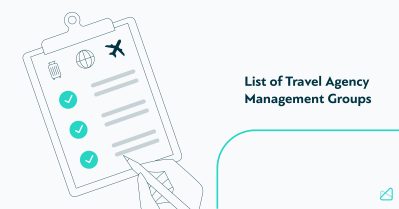
List of 32 travel agency management groups
6 min. Whether you are thinking of moving into the travel industry or you already own a business in this sector, the concept of travel agency management groups is a task worthy of analysis and study. Defining an effective business model for your retail travel agency is one of the key factors in optimizing sales […]
We earn commissions if you shop through the links below. Read more
Tour Operator Business
Back to All Business Ideas
Starting a Tour Operator Business: 13 Key Steps
Written by: Carolyn Young
Carolyn Young is a business writer who focuses on entrepreneurial concepts and the business formation. She has over 25 years of experience in business roles, and has authored several entrepreneurship textbooks.
Edited by: David Lepeska
David has been writing and learning about business, finance and globalization for a quarter-century, starting with a small New York consulting firm in the 1990s.
Published on May 17, 2023 Updated on August 6, 2024

Investment range
$2,300 - $10,300
Revenue potential
$108,000 - $360,000 p.a.
Time to build
0 – 3 months
Profit potential
$86,400 - $144,000 p.a.
Industry trend
Here are the most important factors to consider when you want to start a tour operator business:
- Trained staff — Hire experienced and knowledgeable staff who can provide excellent customer service and deliver engaging and informative tours. Proper training ensures your team can handle various situations and enhance the overall experience for your clients.
- Niche — Identify a specific niche for your tour operator business, such as adventure tours, cultural experiences, eco-tours, or historical tours. Focusing on a niche can help you target specific customer segments and differentiate your services from competitors.
- Vehicles — Invest in reliable and comfortable vehicles suitable for your tours. Ensure your fleet meets safety standards and is appropriate for the type of tours you offer, whether it’s city tours, off-road adventures, or long-distance travel.
- Register your business — A limited liability company (LLC) is the best legal structure for new businesses because it is fast and simple. Form your business immediately using ZenBusiness LLC formation service or hire one of the best LLC services on the market.
- Legal business aspects — Register for taxes, open a business bank account, and get an EIN .
- Licenses and certifications — Obtain the necessary licenses and certifications to operate your tour operator business legally. This may include business licenses, tour guide certifications, and special permits for specific tour activities.
- Online presence — Create a professional website and maintain an active online presence. Use your website to provide information about your tours, booking options, and customer reviews. Implement SEO strategies to attract potential customers and increase your visibility online.
- Relationships with local attractions — Build strong relationships with local attractions, hotels, restaurants, and other businesses to create comprehensive and attractive tour packages. These partnerships can enhance the experience for your clients and provide mutual benefits.
- Develop unique and attractive tour packages — Design unique and engaging tour packages that offer memorable experiences for your clients. Focus on providing high-quality, well-organized tours that showcase the best of your niche.
You May Also Wonder:
Is a tour operator business profitable?
A tour operator business can be profitable depending on various factors such as market demand, pricing strategies, operational efficiency, and the ability to provide exceptional customer tour experiences.
What happens during a typical day at a tour operator business?
During a typical day at a tour operator business, various activities take place to ensure smooth operations and high-quality service. These include responding to customer inquiries and booking requests, designing and customizing tour itineraries, coordinating with suppliers, managing reservations and payments, addressing customer feedback, conducting research on new destinations, and collaborating with marketing and sales teams.
What is the growth potential of a tour operator business?
The growth potential of a tour operator business is significant, with opportunities to expand services to new destinations, diversify tour offerings, enhance customer experiences, and leverage digital marketing strategies. Developing partnerships with other businesses in the travel industry can also contribute to growth and increased revenue potential.
What type of business is a tour operator business?
A tour operator business falls under the travel and tourism industry and operates as a service-based business that organizes and arranges travel experiences for individuals or groups. The business acts as an intermediary between customers and various suppliers, providing comprehensive and well-planned travel experiences through pre-packaged tours or customized itineraries.
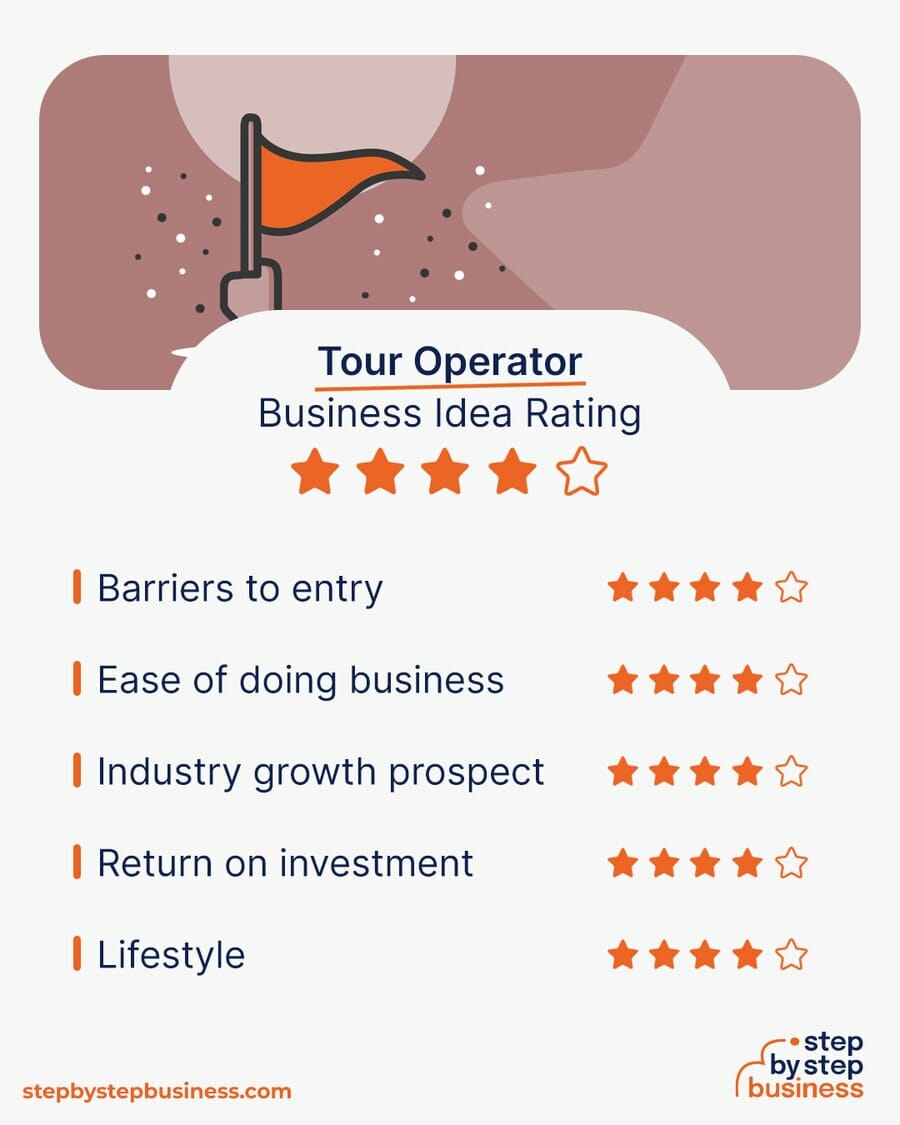
Step 1: Decide if the Business Is Right for You
Pros and cons.
- Meet lots of people and show them a good time
- Good profit potential
- Growing market
- Business needs to be based in an area with attractions of some kind
- Can be somewhat seasonal
Tour operator industry trends
Industry size and growth.
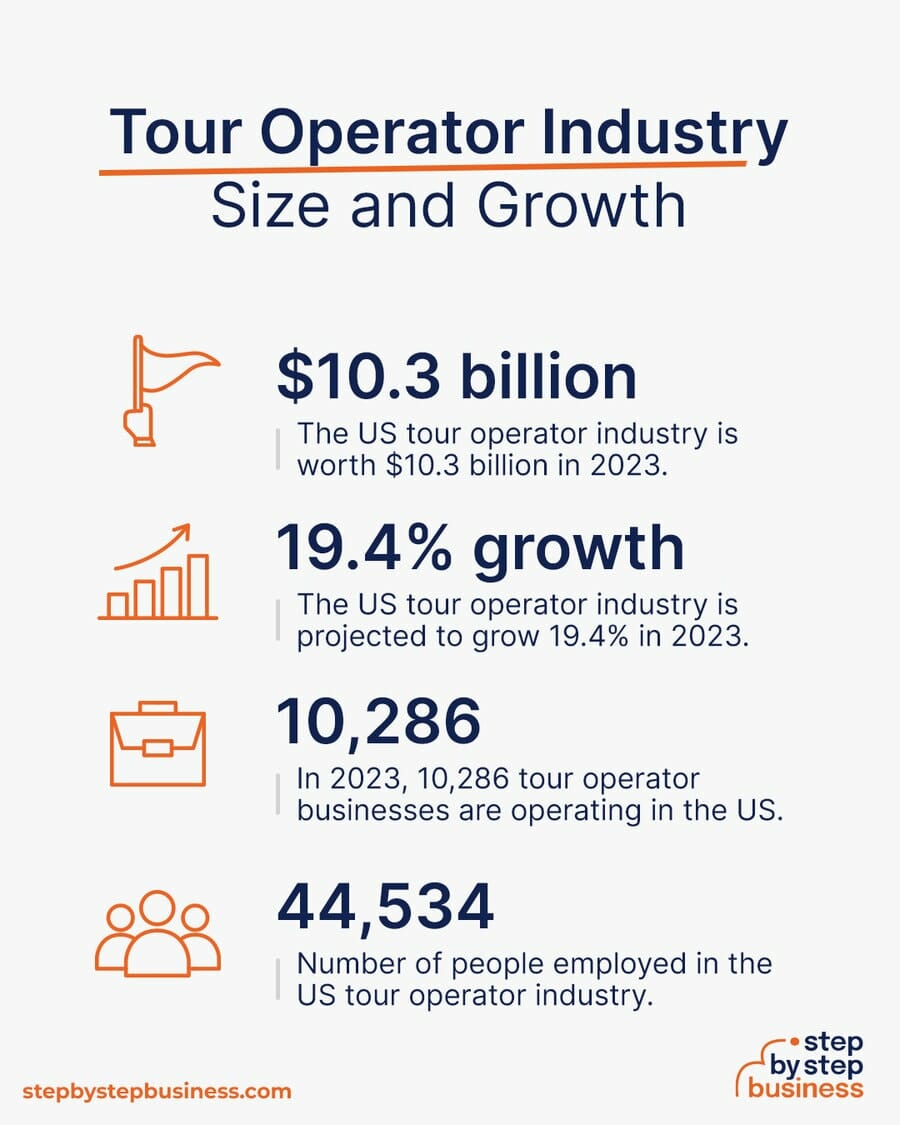
- Industry size and past growth – The U.S. tour operator industry is worth $10.3 billion in 2023 after declining an average of 3.4% annually for the last five years due to the pandemic.(( https://www.ibisworld.com/united-states/market-research-reports/tour-operators-industry/#:~:text=Tour%20Operators%20in%20the%20US%20industry%20trends%20(2018%2D2023),falls%20to%206.6%25%20of%20revenue. ))
- Growth forecast – The U.S. tour operator industry is projected to grow an impressive 19.4% in 2023.
- Number of businesses – In 2023, 10,286 tour operator businesses are operating in the U.S.
- Number of people employed – In 2023, the U.S. tour operator industry employs 44,534 people.
Trends and challenges
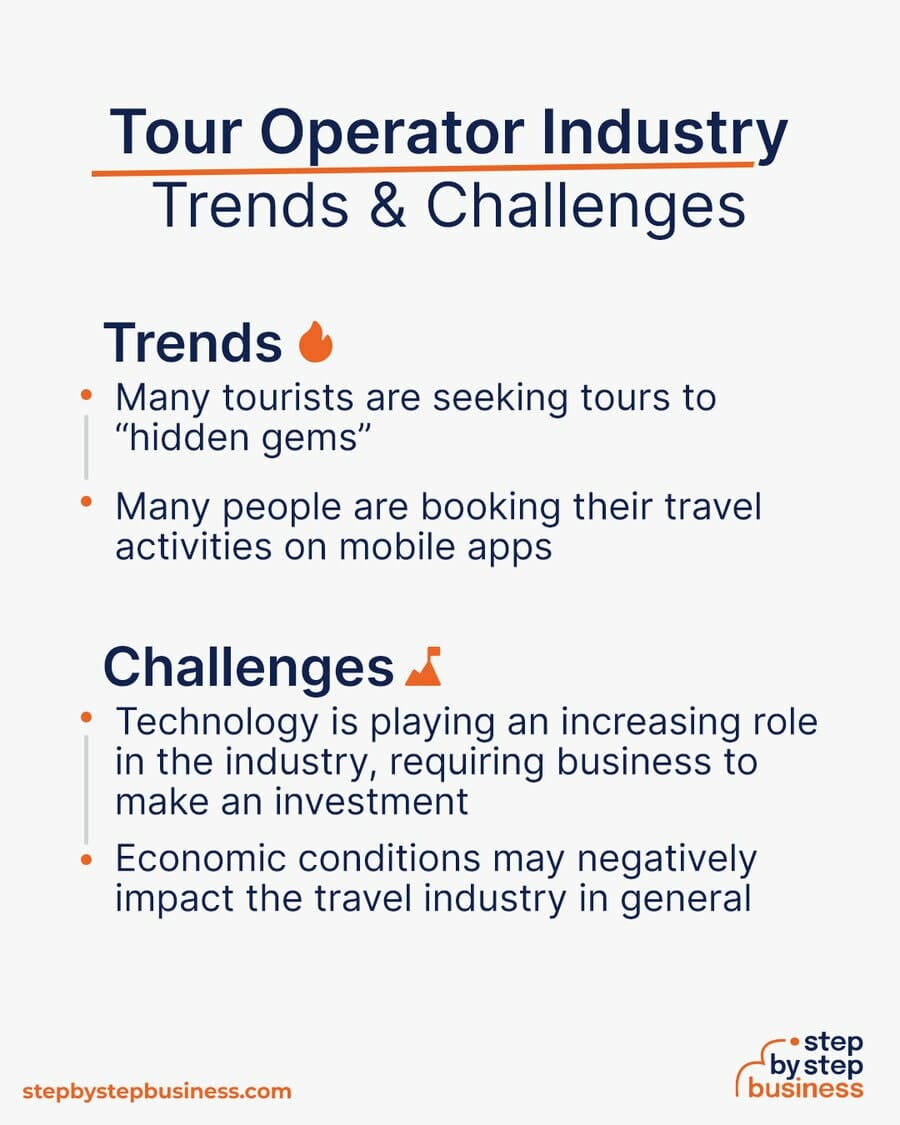
- Many tourists are seeking tours to “hidden gems” rather than the normal tourist spots.
- Many people are booking their travel activities, including tours, on mobile apps.
- Technology is playing an increasing role in the tour operators industry, requiring tour operator business to make an investment in technology.
- Current economic conditions may negatively impact the travel industry in general.
Demand hotspots
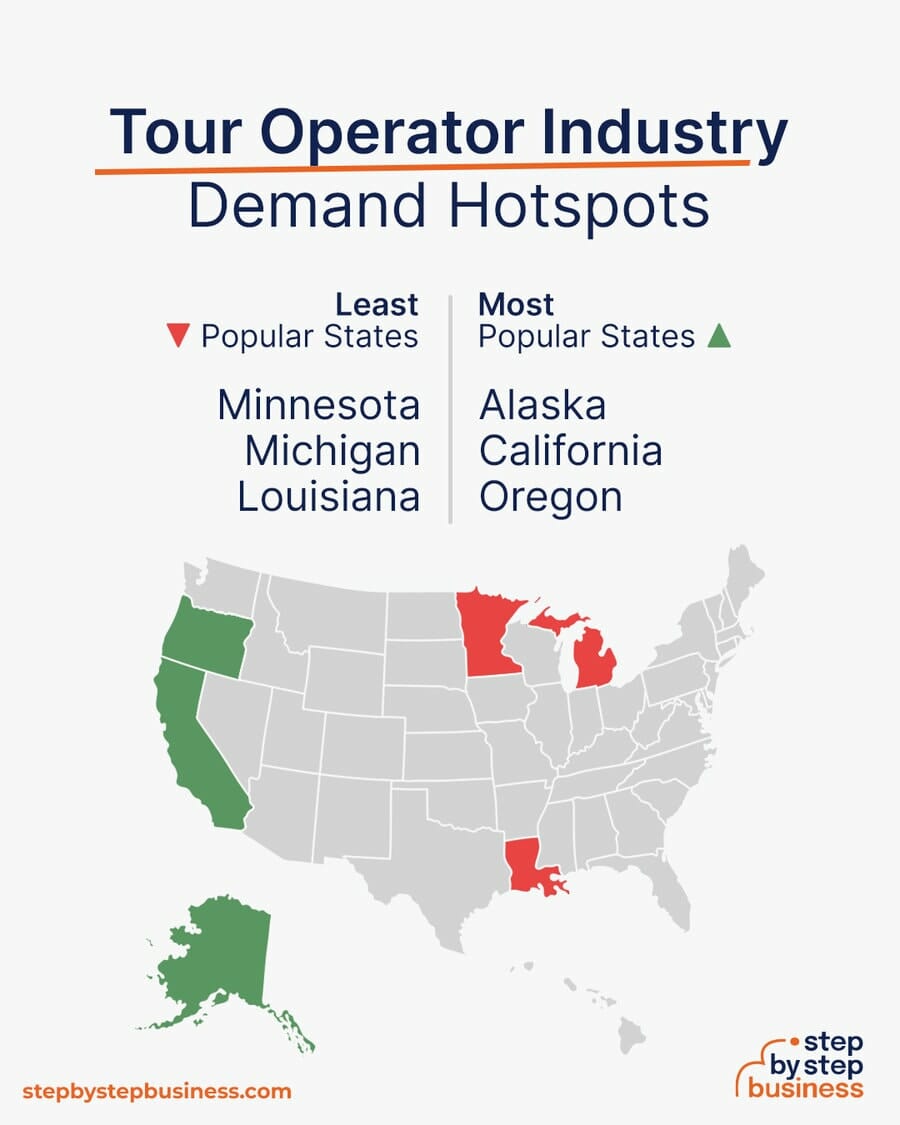
- Most popular states – The most popular states for tour guides are Alaska, California, and Oregon. (( https://www.zippia.com/tour-guide-jobs/best-states/#oregon ))
- Least popular states – The least popular states for tour guides are Minnesota, Michigan, and Louisiana.
What kind of people work in tour operator businesses?
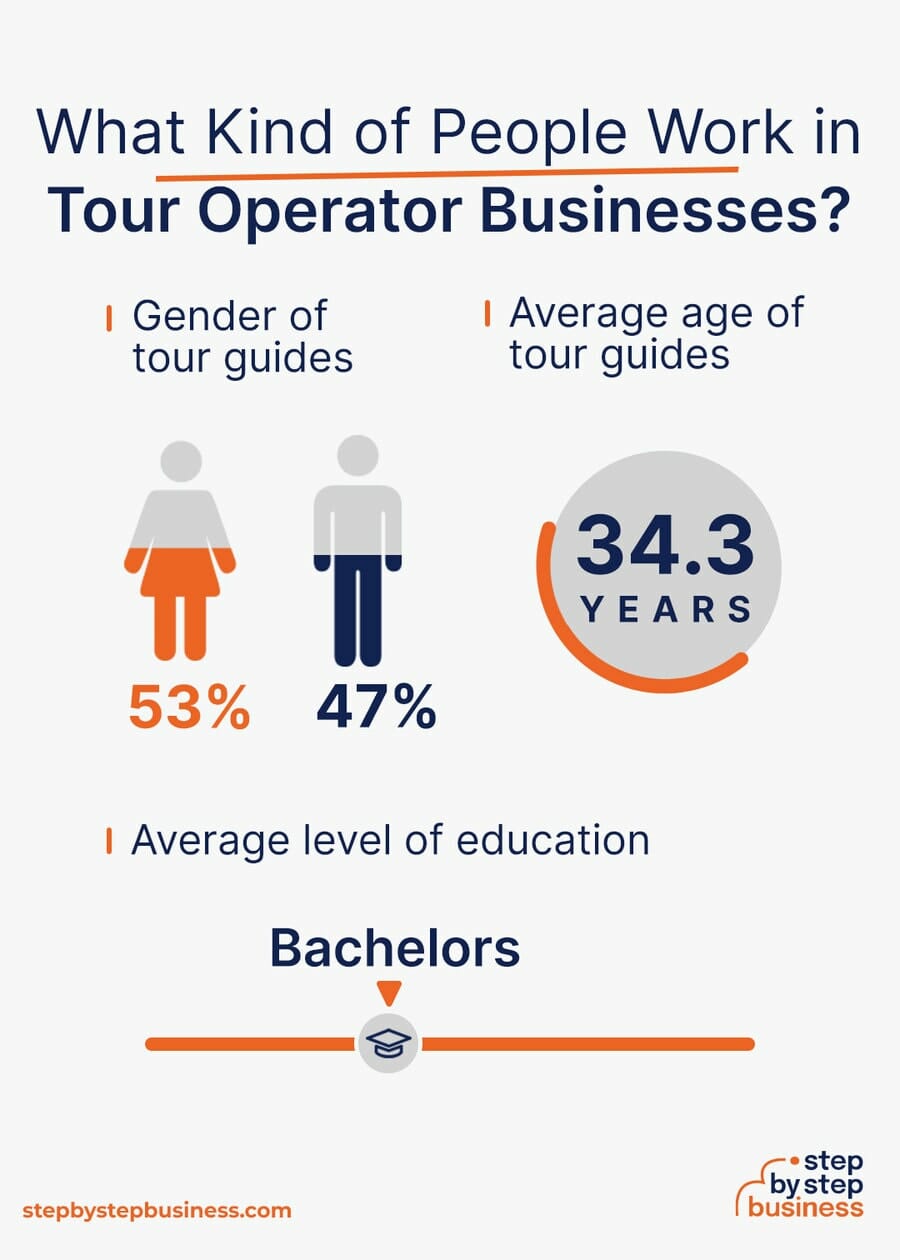
- Gender – 53% of tour guides are female, while 47% are male. (( https://www.zippia.com/tour-guide-jobs/demographics/ ))
- Average level of education – T he average tour guide has a bachelor’s degree.
- Average age – The average tour guide in the US is 34.3 years old.
How much does it cost to start a tour operator business?
If you’re going to do walking tours, your startup costs should be around $2,000. Costs include a computer and a website. If you plan to give tours in a vehicle like a trolley, your costs will be closer to $10,000.
How much can you earn from a tour operator business?
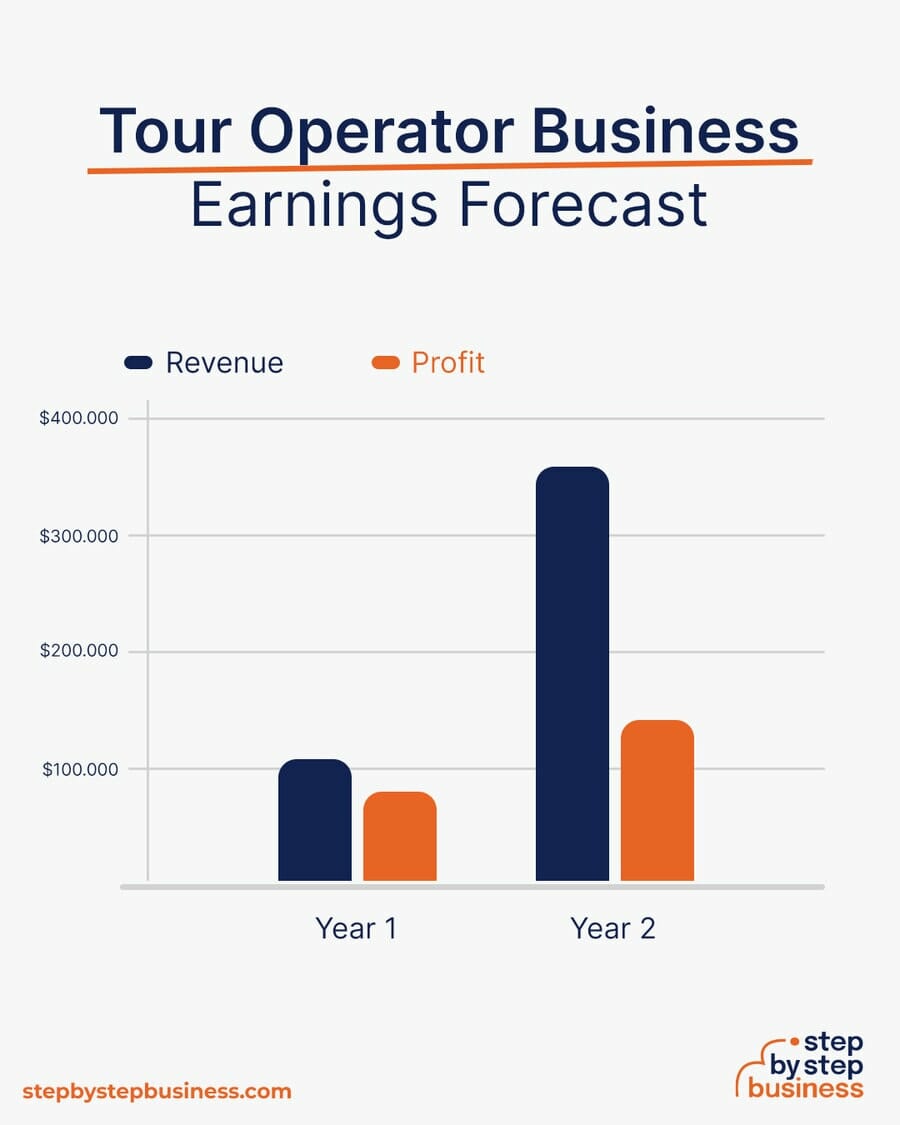
You can probably charge about $120 per person for a half day tour or $200 for a full day tour. Your profit margin should be about 80% if you run your business from home.
In your first year or two, you could work from home and have 30 customers a week, 30 weeks a year, at $120, bringing in $108,000 in revenue. This would mean $86,400 in profit, assuming that 80% margin.
As you gain traction, you might have 100 customers a week, 30 weeks a year. At this stage, you might have a kiosk and hire staff, reducing your margin to around 40%. With annual revenue of $360,000, you’d make a tidy profit of $144,000.
What barriers to entry are there?
There are a few barriers to entry for a tour operator business. Your biggest challenges will be:
- Being in a good location where people will pay for tours
- Having extensive knowledge of your tour area
Related Business Ideas

13 Steps to Start an Airbnb Business

How to Start a Travel Agency – Learn from Real Entrepreneurs

How to Start a Bed & Breakfast Business (with Checklist)
Step 2: hone your idea.
Now that you know what’s involved in starting a tour operator business, it’s a good idea to hone your concept in preparation to enter a competitive market.
Market research could give you the upper hand even if you’ve got the perfect product. Conducting robust market research is crucial, as it will help you better understand your customers, your competitors, and the broader business landscape.
Analyze your competitors
Research tour operator businesses to examine their services, price points, and customer reviews.
- Make a list of tour operator businesses that offer similar services.
- Review your competitors’ services – their features, pricing, and quality – and marketing strategies.
- Check out their online reviews and ratings on Google, Yelp, and Facebook to get an idea of what their customers like and dislike.
- Identify your competitors’ strengths and weaknesses.
This should identify areas where you can strengthen your business and gain a competitive edge to make better business decisions.
Why? Identify an opportunity
You’re looking for a market gap to fill. For instance, maybe the local market is missing an inbound tour operator, or a tour guide business that offers travel agency services as well.
You might consider targeting a niche, such as food scene tours or adventure travel tours.
This could jumpstart your word-of-mouth marketing and attract clients right away.
What? Determine your services
You’ll need to determine what kind of tours you want to give. Consider what’s in your area that might be of interest to tourists. Your best bet is to pick a niche that other tour companies are not targeting. You could also offer travel agent services like booking hotel accommodations or flights.
How much should you charge for tours?
Your prices should be based on market prices in your area, but also on your operating costs.
Once you know your costs, use this Step By Step profit margin calculator to determine your mark-up and final price points. Remember, the prices you use at launch should be subject to change if warranted by the market.
Who? Identify your target market
Your target market is likely to be tourists, and the tourists who participate in tours are often older, but it will depend on the type of tours you offer. If your tours are likely to appeal to older tourists, you can market to them on Facebook. However, your best bet is to partner with travel agencies who can promote and book your tours.
Where? Choose your business premises
In the early stages, you may want to run your business from home to keep costs low. But as your business grows, you’ll likely need to hire workers for various roles and may need to rent out an office or a invest in a kiosk to set up in high traffic tourist areas. You can find commercial space to rent in your area on sites such as Craigslist , Crexi , and Instant Offices .
When choosing a commercial space, you may want to follow these rules of thumb:
- Central location accessible via public transport
- Ventilated and spacious, with good natural light
- Flexible lease that can be extended as your business grows
- Ready-to-use space with no major renovations or repairs needed
Step 3: Brainstorm a Tour Company Name
Here are some ideas for brainstorming your business name:
- Short, unique, and catchy names tend to stand out
- Names that are easy to say and spell tend to do better
- Name should be relevant to your product or service offerings
- Ask around — family, friends, colleagues, social media — for suggestions
- Including keywords, such as “tours” or “guided tours”, boosts SEO
- Name should allow for expansion, for ex: “GlobeStride” or “Boundless Journeys” over “EcoTreks” or “Dive Quest”
- A location-based name can help establish a strong connection with your local community and help with the SEO but might hinder future expansion
Once you’ve got a list of potential names, visit the website of the US Patent and Trademark Office to make sure they are available for registration and check the availability of related domain names using our Domain Name Search tool. Using “.com” or “.org” sharply increases credibility, so it’s best to focus on these.
Find a Domain
Powered by GoDaddy.com
Finally, make your choice among the names that pass this screening and go ahead and reserve your business name with your state, start the trademark registration process, and complete your domain registration and social media account creation.
Your business name is one of the key differentiators that sets your business apart. Once you pick a name, reserve it and start with the branding, it’s hard to switch to a new name. So be sure to carefully consider your choice before moving forward.
Step 4: Create a Tour Operator Business Plan
Here are the key components of a business plan:

- Executive Summary: Summarize your tour operator business, highlighting the unique travel experiences you offer and your target market.
- Business Overview: Describe your tour operator business, including the types of tours you provide, destinations you cover, and the travel niche you specialize in.
- Product and Services: Detail the tour packages and services you offer, such as guided tours, transportation, accommodations, and any unique experiences or add-ons.
- Market Analysis: Analyze the demand for travel and tours in your chosen destinations, considering factors like tourism trends, customer preferences, and competitor offerings.
- Competitive Analysis: Identify other tour operators in your target locations, their strengths and weaknesses, and explain how your tours will differentiate themselves through quality, pricing, or unique experiences.
- Sales and Marketing: Outline your strategies for reaching and attracting customers, including digital marketing, partnerships with hotels or travel agencies, and promotions to drive bookings.
- Management Team: Introduce key team members responsible for running the tour operator business, highlighting their experience in the travel industry and customer service.
- Operations Plan: Describe the logistics of running your tours, including itinerary planning, tour guides, transportation, safety measures, and quality control.
- Financial Plan: Present financial projections for your tour operator business, including startup costs, revenue forecasts based on anticipated bookings, expenses for tour logistics, and expected profitability.
- Appendix: Include any relevant documents, such as tour itineraries, partnerships with hotels or attractions, insurance policies, and marketing materials.
If you’ve never created a business plan, it can be an intimidating task. You might consider hiring a business plan specialist to create a top-notch business plan for you.
Step 5: Register Your Business
Registering your business is an absolutely crucial step — it’s the prerequisite to paying taxes, raising capital, opening a bank account, and other guideposts on the road to getting a business up and running.
Plus, registration is exciting because it makes the entire process official. Once it’s complete, you’ll have your own business!
Choose where to register your company
Your business location is important because it can affect taxes, legal requirements, and revenue. Most people will register their business in the state where they live, but if you are planning to expand, you might consider looking elsewhere, as some states could offer real advantages when it comes to tour operator businesses.
If you’re willing to move, you could really maximize your business! Keep in mind, it’s relatively easy to transfer your business to another state.
Choose your business structure
Business entities come in several varieties, each with its pros and cons. The legal structure you choose for your tour operator business will shape your taxes, personal liability, and business registration requirements, so choose wisely.
Here are the main options:

- Sole Proprietorship – The most common structure for small businesses makes no legal distinction between company and owner. All income goes to the owner, who’s also liable for any debts, losses, or liabilities incurred by the business. The owner pays taxes on business income on his or her personal tax return.
- General Partnership – Similar to a sole proprietorship, but for two or more people. Again, owners keep the profits and are liable for losses. The partners pay taxes on their share of business income on their personal tax returns.
- Limited Liability Company ( LLC ) – Combines the characteristics of corporations with those of sole proprietorships or partnerships. Again, the owners are not personally liable for debts. Here’s how to form an LLC .
- C Corp – Under this structure, the business is a distinct legal entity and the owner or owners are not personally liable for its debts. Owners take profits through shareholder dividends, rather than directly. The corporation pays taxes, and owners pay taxes on their dividends, which is sometimes referred to as double taxation. Read how to start a corporation here .
- S Corp – An S-Corporation refers to the tax classification of the business but is not a business entity. An S-Corp can be either a corporation or an LLC , which just need to elect to be an S-Corp for tax status. In an S-Corp, income is passed through directly to shareholders, who pay taxes on their share of business income on their personal tax returns.
We recommend that new business owners choose LLC as it offers liability protection and pass-through taxation while being simpler to form than a corporation. You can form an LLC in as little as five minutes using an online LLC formation service. They will check that your business name is available before filing, submit your articles of organization , and answer any questions you might have.
Form Your LLC
Choose Your State
We recommend ZenBusiness as the Best LLC Service for 2024

Step 6: Register for Taxes
The final step before you’re able to pay taxes is getting an Employer Identification Number , or EIN. You can file for your EIN online or by mail or fax: visit the IRS website to learn more. Keep in mind, if you’ve chosen to be a sole proprietorship you can simply use your social security number as your EIN.
Once you have your EIN, you’ll need to choose your tax year. Financially speaking, your business will operate in a calendar year (January–December) or a fiscal year, a 12-month period that can start in any month. This will determine your tax cycle, while your business structure will determine which taxes you’ll pay.
The IRS website also offers a tax-payers checklist , and taxes can be filed online.
It is important to consult an accountant or other professional to help you with your taxes to ensure you are completing them correctly.
Step 7: Fund your Business
Securing financing is your next step and there are plenty of ways to raise capital:

- Bank loans: This is the most common method but getting approved requires a rock-solid business plan and strong credit history.
- SBA-guaranteed loans: The Small Business Administration can act as guarantor, helping gain that elusive bank approval via an SBA-guaranteed loan .
- Government grants: A handful of financial assistance programs help fund entrepreneurs. Visit Grants.gov to learn which might work for you.
- Friends and Family: Reach out to friends and family to provide a business loan or investment in your concept. It’s a good idea to have legal advice when doing so because SEC regulations apply.
- Crowdfunding: Websites like Kickstarter and Indiegogo offer an increasingly popular low-risk option, in which donors fund your vision. Entrepreneurial crowdfunding sites like Fundable and WeFunder enable multiple investors to fund your business.
- Personal: Self-fund your business via your savings or the sale of property or other assets.
Bank and SBA loans are probably the best option, other than friends and family, for funding a tour operator business. You might also try crowdfunding if you have an innovative concept.
Step 8: Apply for Tour Operator Business Licenses and Permits
Starting a tour operator business requires obtaining a number of licenses and permits from local, state, and federal governments.
Federal regulations, licenses, and permits associated with starting your business include doing business as (DBA), health licenses and permits from the Occupational Safety and Health Administration ( OSHA ), trademarks, copyrights, patents, and other intellectual properties, as well as industry-specific licenses and permits.
You may also need state-level and local county or city-based licenses and permits. The license requirements and how to obtain them vary, so check the websites of your state, city, and county governments or contact the appropriate person to learn more.
You could also check this SBA guide for your state’s requirements, but we recommend using MyCorporation’s Business License Compliance Package . They will research the exact forms you need for your business and state and provide them to ensure you’re fully compliant.
This is not a step to be taken lightly, as failing to comply with legal requirements can result in hefty penalties.
If you feel overwhelmed by this step or don’t know how to begin, it might be a good idea to hire a professional to help you check all the legal boxes.
Step 9: Open a Business Bank Account
Before you start making money, you’ll need a place to keep it, and that requires opening a bank account .
Keeping your business finances separate from your personal account makes it easy to file taxes and track your company’s income, so it’s worth doing even if you’re running your tour operator business as a sole proprietorship. Opening a business bank account is quite simple, and similar to opening a personal one. Most major banks offer accounts tailored for businesses — just inquire at your preferred bank to learn about their rates and features.
Banks vary in terms of offerings, so it’s a good idea to examine your options and select the best plan for you. Once you choose your bank, bring in your EIN (or Social Security Number if you decide on a sole proprietorship), articles of incorporation, and other legal documents and open your new account.
Step 10: Get Business Insurance
Business insurance is an area that often gets overlooked yet it can be vital to your success as an entrepreneur. Insurance protects you from unexpected events that can have a devastating impact on your business.
Here are some types of insurance to consider:

- General liability: The most comprehensive type of insurance, acting as a catch-all for many business elements that require coverage. If you get just one kind of insurance, this is it. It even protects against bodily injury and property damage.
- Business Property: Provides coverage for your equipment and supplies.
- Equipment Breakdown Insurance: Covers the cost of replacing or repairing equipment that has broken due to mechanical issues.
- Worker’s compensation: Provides compensation to employees injured on the job.
- Property: Covers your physical space, whether it is a cart, storefront, or office.
- Commercial auto: Protection for your company-owned vehicle.
- Professional liability: Protects against claims from a client who says they suffered a loss due to an error or omission in your work.
- Business owner’s policy (BOP): This is an insurance plan that acts as an all-in-one insurance policy, a combination of the above insurance types.
Step 11: Prepare to Launch
As opening day nears, prepare for launch by reviewing and improving some key elements of your business.
Essential software and tools
Being an entrepreneur often means wearing many hats, from marketing to sales to accounting, which can be overwhelming. Fortunately, many websites and digital tools are available to help simplify many business tasks.
You may want to use industry-specific software, such as Flybook , FareHarbor , or Resmark , to manage your bookings, email communications, and customer lists.
- Popular web-based accounting programs for smaller businesses include Quickbooks , Freshbooks , and Xero .
- If you’re unfamiliar with basic accounting, you may want to hire a professional, especially as you begin. The consequences for filing incorrect tax documents can be harsh, so accuracy is crucial.
Create a website
Website development is crucial because your site is your online presence and needs to convince prospective clients of your expertise and professionalism. You can create your own website using services like WordPress, Wix, or Squarespace . This route is very affordable, but figuring out how to build a website can be time-consuming. If you lack tech-savvy, you can hire a web designer or developer to create a custom website for your business.
Your customers are unlikely to find your website, however, unless you follow Search Engine Optimization (SEO) practices. SEO will help your website appear closer to the top in relevant search results, a crucial element for increasing sales.
Make sure that you optimize calls to action on your website. Experiment with text, color, size, and position of calls to action such as “Book Now”. This can sharply increase purchases.
Here are some powerful marketing strategies for your future business:
- Leverage Social Media Influencers: Collaborate with travel influencers on platforms like Instagram and YouTube to showcase your tour packages, tapping into their engaged audiences and fostering trust through authentic experiences.
- Run Targeted Online Ads: Utilize platforms like Google Ads and social media advertising to target specific demographics interested in travel, ensuring your ads reach potential customers who are more likely to engage with your tours.
- Create Compelling Visual Content: Invest in high-quality photos and videos of your tour destinations, sharing them across social media, your website, and promotional materials to evoke emotions and entice potential customers.
- Implement Referral Programs: Encourage satisfied customers to refer friends and family by offering incentives such as discounts or exclusive perks, amplifying your customer base through word-of-mouth marketing.
- Collaborate with Local Businesses: Partner with local hotels, restaurants, and other businesses to cross-promote services, creating mutually beneficial relationships that expand your reach within the travel community.
- Host Virtual Tours: Capitalize on the growing trend of virtual experiences by offering online tours or live-streamed previews, allowing potential customers to get a taste of your offerings before committing.
- Optimize for Local Search: Ensure your business appears in local search results by optimizing your Google My Business profile, collecting positive reviews, and providing accurate information, making it easier for customers to find and choose your tours.
- Offer Limited-Time Promotions: Create a sense of urgency by periodically offering limited-time promotions or exclusive deals, encouraging potential customers to book your tours sooner rather than later.
- Attend Travel Expos and Events: Participate in travel expos and events to showcase your offerings directly to an audience interested in travel, allowing you to engage with potential customers face-to-face and establish personal connections.
- Focus on Customer Experience: Prioritize exceptional customer service and personalized experiences to build a positive reputation, as satisfied customers are more likely to become repeat clients and ambassadors for your business.
Focus on USPs

Unique selling propositions, or USPs, are the characteristics of a product or service that sets it apart from the competition. Customers today are inundated with buying options, so you’ll have a real advantage if they are able to quickly grasp how your tour operator business meets their needs or wishes. It’s wise to do all you can to ensure your USPs stand out on your website and in your marketing and promotional materials, stimulating buyer desire.
Global pizza chain Domino’s is renowned for its USP: “Hot pizza in 30 minutes or less, guaranteed.” Signature USPs for your tour operator business could be:
- Discover the extraordinary with our immersive and personalized tours
- Leave no stone unturned with our comprehensive and authentic tour itineraries
- Discover the hidden gems with our knowledgeable tour guides
You may not like to network or use personal connections for business gain. But your personal and professional networks likely offer considerable untapped business potential. Maybe that Facebook friend you met in college is now running a tour operator business, or a LinkedIn contact of yours is connected to dozens of potential clients. Maybe your cousin or neighbor has been working in tour operator businesses for years and can offer invaluable insight and industry connections.
The possibilities are endless, so it’s a good idea to review your personal and professional networks and reach out to those with possible links to or interest in tour operator businesses. You’ll probably generate new customers or find companies with which you could establish a partnership.
Step 12: Build Your Team
If you’re starting out small from a home office, you may not need any employees. But as your business grows, you will likely need workers to fill various roles. Potential positions for a tour operator business include:
- Tour Guides – give tours, customer service
- Marketing Lead – create and implement marketing strategies
- General Manager – scheduling, accounting
At some point, you may need to hire all of these positions or simply a few, depending on the size and needs of your business. You might also hire multiple workers for a single role or a single worker for multiple roles, again depending on need.
Free-of-charge methods to recruit employees include posting ads on popular platforms such as LinkedIn, Facebook, or Jobs.com. You might also consider a premium recruitment option, such as advertising on Indeed , Glassdoor , or ZipRecruiter . Further, if you have the resources, you could consider hiring a recruitment agency to help you find talent.
Step 13: Run a Tour Operator Business – Start Making Money!
The tourism industry has bounced back in a big way since the pandemic, so now could be a great time to start a tour operator business. It’s an exciting way to share the highlights of your area, have some fun, and make some money. You could eventually hire a whole team of tour guides to take your business to the next level.
Now that you understand the business, you’re ready to plan your itineraries and get your successful tour operator business on the road!
Leave a Reply Cancel reply
Your email address will not be published. Required fields are marked *
Save my name, email, and website in this browser for the next time I comment.
- Decide if the Business Is Right for You
- Hone Your Idea
- Brainstorm a Tour Company Name
- Create a Tour Operator Business Plan
- Register Your Business
- Register for Taxes
- Fund your Business
- Apply for Tour Operator Business Licenses and Permits
- Open a Business Bank Account
- Get Business Insurance
- Prepare to Launch
- Build Your Team
- Run a Tour Operator Business - Start Making Money!
Subscribe to Our Newsletter
Featured resources.

20 Side Business Ideas (Side Hustles) for Extra Income
Carolyn Young
Published on December 4, 2022
Remember that time you found a $20 bill in the pocket of your old jeans? Now, imagine experiencing that kind of unexpected delight, but instead offi ...

Top 21 Profitable Agency Business Ideas for Entrepreneurs
David Lepeska
Published on August 11, 2022
Dreaming of running your own agency? There are a lot of possibilities out there, from travel to advertising and marketing, to recruiting, SEOconsult ...

21 Tourism and Travel Business Ideas
Published on July 21, 2022
The tourism industry is massive and diverse, offering many opportunities for sharp entrepreneurs. You could start a travel agency, a campground, ah ...
No thanks, I don't want to stay up to date on industry trends and news.
How to Start a Tourism Business from Scratch
Dreaming of starting your own tourism business? Imagine leading exciting tours, sharing beautiful destinations with others, and building a business around your love of travel. But how do you begin?
In this guide, we'll show you the essential steps to get your tourism business off the ground. We'll explore practical strategies and key considerations to help you turn your passion for travel into a successful business venture. Get ready to embark on an entrepreneurial journey and learn how to start your tourism business, one step at a time.
1. Start with Market Research

Conduct thorough market research to identify your target audience, competition, and potential niches in the tourism industry.
Market research helps tourism businesses identify their target markets. This involves understanding potential customers' demographics, interests, and preferences.
For example, research may reveal that a particular destination is popular among adventure-seeking millennials, while another attracts retirees looking for relaxation.
Here's how to research the market:
- Identify Target Audience : Determine the demographics, interests, and travel preferences of potential customers.
- Utilize Online Tools : Use Google Trends, social media insights, and travel forums for data on popular destinations and trends.
- Analyze Competitors : Research competitors’ offerings, strengths, weaknesses, and customer reviews.
- Attend Trade Shows : Gain insights into industry trends and network with professionals.
- Test Concepts : Run pilot tours and gather feedback before full-scale launch.
2. Create a Business Plan
Create your own business plan from your market research. What should it include? A comprehensive tour business plan outlining your business goals, strategies, financial projections, and marketing strategies.
Create your own tour business plan with these steps:
- Set Clear Goals : Outline specific, measurable objectives for your business.
- Outline Strategies : Define key strategies for operations, customer service, and tour development.
- Financial Projections : Include startup costs, revenue forecasts, and break-even analysis.
- Marketing Plan : Identify your target audience and marketing channels.
- Market Analysis : Summarize findings about customer needs and competitors.
- Operational Details : Describe daily operations, staffing, and tour schedules.
- Risk Management : Identify potential risks and mitigation strategies.
- Sustainability Practices : If relevant, include eco-friendly operational plans.
- Funding Needs : Detail required capital and potential funding sources.
- Exit Strategy : Plan for future business transitions or sale.
3. Choose a Legal Structure

Choosing the right legal structure for a tourism business is crucial. Sole proprietorships and partnerships are simpler but have personal liability.
LLCs offer balance, while corporations provide extensive liability protection, but involve complexity.
Here's what you can do.
- Evaluate Liability and Complexity : Consider sole proprietorships and partnerships for simplicity with personal liability, LLCs for balanced liability protection and ease of operation, and corporations for extensive liability protection but with more complexity.
- Assess Ownership and Taxes : Choose a structure based on the number of owners, preferred tax treatment, and financial practices.
- Plan for Growth : Select a structure that aligns with your future growth plans and scalability.
- Understand Legal Implications : Recognize how each structure affects legal responsibilities and operational procedures.
- Consult Experts : Seek advice from legal and financial professionals to make an informed decision.
4. Obtain Business Licenses and Permits
Obtain the necessary licenses and permits required for your tourism business, which may vary by location and the type of services you offer.
- Research Local Requirements : Investigate the specific licenses and permits required in your area and for the type of tourism services you plan to offer.
- Check with Government Agencies : Contact local, state, and federal agencies to understand all regulatory requirements.
- Prepare Documentation : Gather all necessary documents, such as identification, business plans, and insurance proof, required for the application process.
- Apply in a Timely Manner : Submit your application well before your planned start date to avoid any delays in launching your business.
- Stay Updated on Renewals : Keep track of expiration dates and renew licenses and permits as needed to ensure continuous compliance.
These steps help ensure that your tourism business meets all legal requirements and operates smoothly.
5. Select a Location

Choosing the right location for a tourism business is crucial. It can affect visibility, accessibility, and target customers.
Here are some points to consider:
- Consider Proximity to Attractions : Select a location close to popular tourist destinations or areas of interest to attract more customers.
- Evaluate Accessibility and Visibility : Ensure the location is easily accessible by public transport or has ample parking, and is visible and easy to find for tourists.
- Understand Local Regulations : Research local zoning laws and regulations to ensure your business can operate smoothly in the chosen area.
6. Acquire Resources
.webp)
Secure the necessary resources, such as vehicles, equipment, technology, and skilled staff, to deliver your services effectively.
- Invest in Essential Equipment : Invest in the necessary vehicles, equipment, and technology tailored to the type of tours or services you offer.
- Hire Qualified Staff : Recruit skilled and experienced staff to ensure high-quality service delivery.
- Utilize Efficient Technology : Adopt relevant technology solutions for bookings, operations, and customer management to streamline your business processes.
7. Develop Branding

Develop a strong brand identity, including a memorable name, logo, and tagline that resonates with your target audience. Strong brands not only attracts customers but also foster loyalty and trust.
- Craft a Unique Brand Identity : Select a name, logo, and tagline that embody your business's spirit and appeal to your target market. Tools like Canva for design, Shopify 's Business Name Generator for name ideas, and Looka for logo creation can be very helpful.
- Ensure Brand Consistency : Maintain a uniform brand appearance and tone across all platforms. Use tools like Adobe Spark for creating consistent marketing materials and Buffer for cohesive social media management.
- Leverage Brand in Marketing Strategies : Base your marketing efforts on your brand identity to strengthen your market presence. Tools like Hootsuite for social media management and Mailchimp for email marketing can integrate your branding into various marketing channels effectively.
Branding is the guiding compass that will shape your marketing strategies, customer interactions, and the overall reputation of the business in the competitive world of tourism.
8. Boost Online Presence

Create a professional website and establish a strong online presence through social media, online advertising, and search engine optimization (SEO).
- Create a User-Friendly Booking Website : Use platforms like WordPress or Squarespace to build a website that showcases your tours, optimized for mobile users.
- Use Social Media Wisely :
- Instagram & Pinterest : Post beautiful photos and videos of destinations.
- Facebook : Share updates and ads, and engage with customers.
- Twitter : Tweet quick updates and respond to customer inquiries.
- YouTube : Upload virtual tours and customer testimonials.
- Optimize for Local Search Engines (SEO) : Improve your website's ranking in local search results, like 'near-me' searches, by using relevant keywords and creating quality content.
- Try Online Advertising : Use Google Ads for targeted advertising to reach potential clients.
- Keep Content Fresh : Regularly update your website and social media with new and engaging content.
9. Expand Marketing Strategies
Implement marketing strategies to attract tourists, such as content marketing, partnerships with travel agencies, and targeted advertising.
- Engage in Content Marketing : Develop and share engaging content such as travel blogs, videos, and social media posts that highlight your tours and destinations.
- Collaborate with Travel Agencies and Resellers : Build partnerships with travel agencies and tour resellers to expand your market reach and visibility.
- Utilize Targeted Advertising : Employ targeted online advertising through platforms like Google Ads and social media to attract specific customer demographics.
- Partner with Local Hotels and Accommodations : Establish partnerships with local hotels and accommodations to create joint packages or promotions.
- Connect with Tour Affiliates : Work with affiliate marketers who can promote your tours to their audiences for a commission. TicketingHub gives this option to tour operators and even enables resellers to track their own bookings in a dashboard.
10. Build Tour Packages
Design and package your tour offerings, considering factors like itinerary, pricing, inclusions, and customer experience.
- Design Attractive Itineraries : Create engaging tour itineraries that cover key attractions and unique experiences.
- Set Competitive Pricing : Determine pricing that offers value to customers while remaining competitive in the market.
- Define Package Inclusions : Clearly specify what is included in each package, such as meals, transportation, and entry fees.
- Focus on Customer Experience : Ensure each tour package offers a memorable and satisfying customer experience.
11. Choose a Booking and Reservation System

Set up an efficient booking and reservation system to manage bookings, payments, and customer information.
Why do you need a booking system?
- Streamline Bookings and Payments : Automates the booking process, making it easier for customers to book tours and for businesses to manage payments.
- Organize Customer Information : Centralizes customer data, enabling better customer relationship management and personalized service.
- Improve Operational Efficiency : Reduces manual workload, minimizes errors, and enhances overall operational productivity.
12. Develop Customer Service Guidelines

Develop excellent customer service protocols to ensure tourists have a positive experience and receive timely support. Tourism businesses strive to provide personalized assistance to travelers.
This involves understanding the unique needs and preferences of each customer and tailoring services accordingly.
Here are suggestions for what these protocols could include:
- Personalized Interaction : Training staff to recognize and adapt to individual customer preferences, tailoring services like tour customization accordingly.
- Prompt Communication : Establish standards for swift and clear communication with customers across various channels (email, phone, social media).
- Comprehensive Training for Staff : Develop thorough training programs focusing on customer interaction, problem-solving, and knowledge about destinations and services offered.
- Effective Feedback System : Set up a process for collecting and responding to customer feedback, using insights to improve services and address concerns promptly.
- Emergency Response Protocol : Includes guidelines for handling emergency or unexpected situations, ensuring customer safety and satisfaction.
In wrapping up our guide to starting a tourism business, remember that your journey is filled with opportunities and challenges. Key steps like market research, choosing the right business structure, getting licenses , and picking the right location lay the foundation for your success.
Focus on creating appealing tour packages, setting up an easy booking system, and building a strong brand and online presence. Don't forget the importance of having a skilled team and providing excellent customer service to make each tourist's experience memorable.
Stay adaptable and responsive to market changes and customer needs. With determination and a well-planned approach, you're well on your way to launching a successful tourism business that delights travelers and stands out in the market. Good luck on your exciting new venture!
FAQ Section
1. how do i start my own tour company.
To start your own tour company, follow these steps:
- Research the Tourism Sector : Understand your market sector, focusing on local tourism and high-demand areas like guided winery tours or airport transportation services.
- Develop a Unique Selling Proposition : Identify what sets your tour company apart from others in the local tourism community.
- Secure Operating Capital : Gather the necessary funds, possibly from business partners or potential lenders, to cover business costs and operating capital.
- Handle the Legal Stuff : Obtain a tour operator license, register your business to trade legally, and ensure you have proper insurance, including liability insurance.
- Set Up a Business Bank Account : Separate your personal and business finances.
- Create a Strong Brand Story : Use free social networking sites, like Facebook page, to build your site's online presence and connect with your customer base.
- Plan Your Services : Whether it's guided tours, rental houses, or transportation services, ensure they align with local tourism needs and safety regulations.
2. How does a tourism company work?
Tourism companies operate within the hospitality industry, providing guided tours, package deals, and transportation. It generates revenue by offering these services directly to customers or through collaboration with local bed and breakfasts and other business owners.
Success relies on understanding customer needs, offering a personal touch, and efficiently managing operating and monthly costs.
3. How do you plan a tourism business?
Planning a tourism business involves:
- Market Analysis : Spend time understanding leisure capacity and preferences within your local tourism body and the broader market sector.
- Financial Planning : Calculate business costs, including potential rental fees, and plan for enough operating capital to cover your business until it grows to attract more business.
- Operational Planning : Consider viable business options, from guided winery tours to airport transportation services. Ensure compliance with all local safety regulations.
- Marketing Strategy : Utilize applicable online directories and review platforms to enhance your tourism company's online presence. Consider purchasing ad space or creating an executive summary to attract new customers.
- Network and Collaborate : Connect with local tourism communities, engage with other tour guides, and explore partnerships for package deals.
- Legal and Regulatory Compliance : Register your business, understand the necessary legal stuff, and secure a tour operator license and proper insurance.
Do I need prior tourism industry experience to start my own tourism business?
While prior experience can be beneficial, it's not always necessary. A passion for travel and a willingness to learn and adapt are equally valuable. You can gain experience and knowledge through research, networking, and relevant courses.
How can I secure funding for my tourism business, especially if I'm just starting out?
Securing funding can be done through various means, including personal savings, loans, grants, or seeking investment from partners or investors. Creating a solid business plan and financial projections can help attract funding.
What marketing strategies are most effective for promoting a new tourism business?
Effective marketing strategies include building a professional online presence, leveraging social media, collaborating with travel influencers or agencies, and offering promotional deals or packages. Identifying your target audience and crafting compelling content are key to successful marketing.
Get the latest news and stay in touch with the industry secrets.
By clicking "Subscribe", you agree to our Privacy Policy and the data we do collect.
.webp)
Mastering the Art of Google Review Response: A Comprehensive Guide for Activity Operators

How to Start a Business in Florida Step-by-Step: A Guide for Tour Businesses

How Much Does It Cost to Start a Trampoline Park?

How to Start an Escape Room Business in 2025
Keep Reading
.webp)
Follow our comprehensive roadmap to build a thriving tour company, focusing on innovative tour design, strategic marketing, & great service.
How to start a Tour Operator business in 2024: A step-by-step guide
By Brieanne Biblow
Share this article:
- Facebook icon
- LinkedIn icon
- Twitter icon
There are so many benefits of being a tour operator , but taking the first step to start your own tour company? That can feel daunting. Like any start-up business, there are lots of pieces that need to come together before you welcome your first customers. With countless resources out there, it’s easy to get overwhelmed when you’ve asked yourself “How do I start an online tour operator business?” We’re here to give you more than just a few tips on starting a travel and tour company. Dive into our practical step-by-step guide on how to start your own tour company.
How to start a Tour Operator business in 2024
1. choose a business niche, 2. register your tour company, 3. design your tour, 4. build relationships , 5. market your tour, 6. launch your tour, choose a business niche.

Find your passion
The first step to becoming a tour operator is to know what you’re passionate about. If you survey a handful of happy tour guests, do you know the number one thing they’ll say makes a difference between a good tour and a tour they’ll recommend to all their friends? A passionate tour guide.
Your passion for cooking could translate into delicious food tours, or your love of the outdoors could turn into hiking tours, even a passion for all things spooky could transform into starting a ghost tour business. So, take some time to find your passion that you can’t wait to share with others every day.
Evaluate your city
Once you have your passion in mind, it’s time to take a look at your city. Is it a popular tourist destination? Is there anything that’s not being explored? While passion is key, it’s equally important to identify if there’s an opportunity. Passion without opportunity is just a hobby. Check in with your local tourism board to see if they have any market research reports that outline the opportunities and challenges in the industry.
Dig into travel and tourism trends
The travel and tourism industry, like any industry, can see larger trends in pop culture trickle down and open up entirely new business opportunities. Your potential customers are being influenced by trends, so why not do some research, incorporate ones that feel like a fit for you, and watch more bookings roll in.
Some 2024 tourism trends that will be influencing travelers:
- Multi-generational tours : Post-retirement boomers will be looking to travel with their entire families. So creating a tour offering that has something for the whole family could be a great idea.
- Cultural connection : More and more, savvy travelers are always looking for something truly authentic to the destination they’ve traveled to. That doesn’t mean you have to be the authentic expert. Instead, think about exploring opportunities to partner with other start-up businesses in your community that could add this element to your tour offering.
- From screens to reality: Keeping a pulse on popular TV shows and movies can be a great way to come up with unique tour ideas that can target new customers for your business.
Identify your target market
Now that you have innovative tourism ideas , you need to map out what your ideal potential customer looks like. Think about the types of people that will be attracted to your tour.
- What’s their age demographic?
- Where are they coming from?
- What language(s) do they speak?
- What interests do they have?
Who your customers are will determine many of the decisions you make later. This information will also be crucial when you create your marketing strategy. So, take the time to get to know your target market.
Research your competitors
Having found your tour idea and evaluated the market in the previous section, you’re almost ready to register your tour company. But first, you’ll need to research your competition, so you know what you’re up against. Head to Google and search simple like “tour operators near me” and ask yourself:
- What are they doing well?
- Where are their gaps?
- What are their price points like?
Then, find ways to differentiate yourself and stand out.
Register your tour company

With your research complete, now is a good time to consider your options for registering your business. Go to your local tourism board and find out the requirements for starting a tour company in your area. Here are some of the legalities you might have to go through.
Name your tour business
The first thing you need to do is name your business. Your tour name will be used in all of your documentation. Make sure your name is both memorable and descriptive. The most important is if the website domain is available. If your name checks all the boxes, go to your local Registrar of Companies to get it approved and then purchase your domain.
Register your business
Now that you have a name you’re ready to make things official by registering your business. There are different options for how you register— sole proprietorship, partnerships, corporations. Speaking to a small business accountant is a great idea to understand the tax implications of each option. Then, evaluate the pros and cons of each before you make your decision.
Get your business license and permits
Once you’ve registered your business, you’ll need to get a local business license. Check in with your local municipality to do this. You might need to obtain additional permits and licensing based on where you are operating and if you have any vehicles.
Purchase liability insurance
Protect your business, yourself, and your guests by getting liability insurance. Accidents happen, that’s a given. But to ensure that you aren’t held personally liable, you’ll want to meet with an insurance company to learn about what coverage your business needs. Some commonly required in the tourism industry are:
- Commercial General Liability (CGL)
- Property Insurance
- Accounts Receivable Insurance
Register as a tour guide
If you are guiding, you might need to complete a course to become a licensed tourist guide. This allows you to take tourists around a designated geographical area. To find out if you need to register as a guide, check in with your local tourism board.
Open a business bank account
Now that you have a business license, you’ll want to open a corporate bank account. This will help you keep track of all your expenses and revenue and make accounting a lot easier.
Design your tour

Write your business plan
With all the legalities taken care of, it’s time to write your business plan.
A business plan is a document that holds all of your ideas. It’s your roadmap that helps you determine how you’ll move forward. Include your company description, market analysis, partnership opportunities, and small business goals . It should also include your marketing plan, operations plan, and a list of your vendors, products, and services. It should also contain a variety of financial projections for your first 1-5 years of business. Remember: it’s okay if you don’t have all the answers right away, but it’s good to know what to focus on as you grow.
Side note: once you get up and running, you should learn how to develop a strategic plan to help you reach your ultimate vision for your tour operator business.
Create your Unique Selling Proposition
With your business plan in hand, it’s time to lock down your unique selling proposition. This explains what makes your tour better than the competition. It’s the benefit that travelers can only get by booking with you — like that you provide ethical travels & tours . You should be able to define this in one sentence.
Set your tour pricing
Now that you’ve evaluated your market it’s time to determine the value of your tour and choose what you will charge. It’s important to consider your operating costs and market value as well as what you think customers are willing to pay. This part often feels overwhelming for a lot of start-up businesses, which is why we’ve created our free Tour Operator Costing Sheet .
Craft your brand story
Now comes the fun part—it’s time to create a compelling story for your tour. Make sure it has a definite beginning, middle, and end. Find themes that you can carry through the entire experience. A clear narrative makes your tour more memorable. The goal is to have your guests telling their friends all the neat things they learned in the weeks that follow.
Design a tour logo
Once you’ve created a story for your tour, it’s time to design your brand around it. The first step is to create a logo. Your logo is the visual representation of your business. It will be used in all of your marketing collateral. You can choose to work with a graphic designer, or give free tools like Canva a try. Lookin for some inspiration? Check out more ideas for branding your business .
Build a travel website
Alright! You’re finally ready to create an online presence for your business . This is how many travelers will find you when researching their trips. If you don’t know how to build a website you have a few options; you could hire a contractor, or try your hand with tools like: Wix , Squarespace , or WordPress . Whatever you choose, make sure your website works with online booking system (like Checkfront 😉).
Set up an online booking system
You don’t just want travelers to find you online; you want them to make, and pay, for reservations right on your website. To do this, you need an online booking system . Your booking system can also be used to process your in-person and over the phone reservations. Here are a few links that will help you find the platform that’s right for you.
- What is an Online Booking System?
- How to Create an Online Booking System in 24 Hours (or Less)
- Start Using Checkfront’s Booking System for Free
Build Relationships

Talk to other tour guides
When starting a business, many entrepreneurs think they need to do everything on their own. This can lead to loneliness and frustration. But, you don’t have to do it alone. Many guides would be happy to share their knowledge with you. Go out and build relationships with other operators in your city, who aren’t direct competitors. Online communities like Tourpreneur are an invaluable resource for tour operators at any stage of their business.
Connect with the local tourism community
Take any opportunity you have to build relationships with local business . While it’s difficult to walk into a room full of strangers and feel like an outsider, you won’t regret pushing yourself to meet other business owners. You’ll feel connected to people in the same boat as you and get a lot from the relationships you make. Just don’t forget to give back. Here are a few key relationships you should build locally:
- With your local city council
- Your local tourism or destination management organization (DMO)
- Your local tourist information office
- Hotel front desks and tour desks
Market Your Tour

With your target market defined and your marketing strategy ready to go, it’s time to get the word out about your amazing business! From online travel agents to social media to email marketing, we’ll cover it all:
List your tours on OTAs
Make it easy for travelers to find you by listing your tour on online travel agents (OTAs). OTA’s like Viator, Expedia Local Expert, Google Things To Do and GetYourGuide already have experience in digital advertising and have built up a mass following. While they will take a commission from your sales, they also have a significant amount of marketing spend at their disposal that your business can benefit from.
Think about it like selling vegetables — while you could set up a booth at a local farmer’s market, you’ll probably get far more customers by selling in a grocery store.
Implement SEO best practices
Now that you’re tour is listed with a couple online travel agents, it’s time to start driving traffic to your website. The best long-term strategy to do so is through search engine optimization (SEO). You can use SEO best practices to optimize your site for Google and other search engines. One of the best things to do is to SEO optimize your product descriptions . That way when someone searches for something related to your tour, your website shows up in search results.
Buy Google Adwords
While SEO is great, it’s a long-term strategy and can takee time to crawl up Google or Bing’s search rankings. To get immediate results you can buy AdWords. Instead of waiting for Google’s algorithm to show your website on the results page, you bid on specific keywords related to your business so your site shows up on top of the page.
Start email marketing
With steady visitor traffic coming to your website, you’ll want to capture their emails so you can stay in touch with them. Email marketing is a powerful tool when done right but it will take some work to stand out in your customers’ inboxes. Our Complete Guide to Email Marketing for Tourism Operators is a great place to start.
Get on Facebook and Instagram
Social media is where your customers are likely spending most of their time online, so you should be there, too. Creating a Facebook page and Instagram account will let you connect to your customers, post pictures of your tours, and make your company information easy to share and recommend. Plus, you can use Facebook Messenger or Instagram’s Direct Messages to answer questions and use the ad network on both platforms to help more people discover your tour.
Launch Your Tour

Host Your Friends and Family
As you prepare for a successful business launch , you’ll want to do a few test runs. We recommend a pre-launch buzz campaign or hosting a few friends and family first. Think of it as your dress rehearsal. Go through the tour from start to finish and collect as much feedback as you can. Once you feel confident that you’ve worked out the kinks, you’re ready to launch!
Final thoughts
Building your own tour business is no easy feat. From designing a tour and evaluating your market, to building relationships, your brand, your online presence, and getting those first customers through the door. There’s a lot of pieces to put together. However, following this step-by-step guide and your intuition you’ll have a successful tour operator business in no time.
Want to get your tour business off to a running start?

Join the 30 Day ‘Things to Do’ Challenge for Tour Operators.
Tackle one small task a day and watch your business grow.
Related Articles

Step-by-step guide to joining Viator and growing your tourism Business
Viator.com, a proud member of the TripAdvisor company, is the leading global provider for tours and activities. Each month, Viator…
- Business Tips

Defining your value proposition: standing out against the competition
You’re not the only one vying for the attention of your ideal customers Demand for epic experiences is growing —…
Search Blog
Subscribe to our newsletter.
Get tips and strategies to grow your business and impress your guests.
Blog Categories
- Booking Management
- Guest Experience
- Marketing Strategies
- Operator Highlights
Your Passport to Success: A Comprehensive Guide to Launching a Tourism Business
- Published: July 13, 2023
- By: Yellowbrick
Spotting the Opportunity
Carving your unique niche, constructing a comprehensive business plan, arranging the financial framework, jumping through legal hoops, crafting a magnetic brand, building a strong online presence, launching and marketing your venture, splash your unique colors onto the vast canvas of the tourism industry.
Enter your email to learn more and get a full course catalog!
- Hidden hide names
- Hidden First Name
- Hidden Last Name

More from Yellowbrick

Top 5 Video Streaming Challenges: How to Overcome Them
Explore video streaming challenges and strategies to overcome them, from bandwidth limitations to DRM issues. Dive into the dynamism of the video streaming industry.

10 Steps to Launch Your News Producer Career Successfully
Discover the key steps to launch a successful news producer career. Explore skills acquisition, degree relevance, internships, networking, and staying updated.

Mastering the Art of Tour Coordination: Skills, Duties & Path to Success
Discover the steps to kick-start your career as a Tour Coordinator. Learn about the key responsibilities, required skills, and necessary steps to excel in this role.
ABOUT YELLOWBRICK
- Work at Yellowbrick
- Privacy Policy
- Terms of Use
STUDENT RESOURCES
- Scholarships
- Student Login
- Beauty Business Essentials
- Beauty Industry Essentials
- Ecommerce Essentials
- Fashion Business Essentials
- Fashion Industry Essentials
- Footwear Business Essentials
- Gaming & Esports Industry Essentials
- Global Sports Management
- Hospitality Industry Essentials
- Music Industry Essentials
- Performing Arts Industry Essentials
- Product Design Essentials
- Sneaker Essentials
- Streetwear Essentials
- TV/Film Industry Essentials
- UX Design Essentials

Parsons faculty, together with design experts from leading organizations, help you build knowledge and skills, explore key trends shaping the future of product design, and gain an understanding of how design, manufacturing, and marketing components work together within the product creation process.
Enter your email to get a free sneak peek, course catalog, and career guide.
Brittany Markle Choreographer/Mentor/Dancer I think my most rewarding experiences have included the success of former students. I take pride in making sure they have the necessary tools to move forward with a career in the entertainment industry and I hope to help them bridge that gap from amateur to professional.

Briah Fowler Marketing and Sales Specialist, New York Giants What's success if you can't share your winnings? As a marketing specialist for the New York Giants, I learned the key to success is giving back. If you can utilize your skill set and talent to help give back to your community, it's one of the most rewarding accomplishments.

Bill Carroll Production Director, Centennial Broadcasting I'm most proud of taking the courage to start a music foundation and help musicians with any kind of disability and who are on the spectrum. It's something close to me and very important to nourish.
Bethany caldwell custom stylist & merchandiser - sales, threadwell clothiers, under armour inc. i am a custom clothier who helps people create custom clothing to look & feel their best -- i like to create quality clothes with meaning -- and i pride myself in making the "experience" part of the process..

Becca Brown NFTs & Collectibles Project Manager, Warner Bros Discovery I'm honored to work with an innovative team where I'm involved in bringing world-renowned brands like DC and Harry Potter to life through cutting-edge collectibles. Seeing our fans engage with our products is incredibly fulfilling and fuels my excitement to continue driving innovation and growth in the licensing space.

B. Danielle Watkins Chief Programmer, iElevate Media Group Writing is my passion, creating is my heart, and telling stories gives me an escape I've never found anywhere else, so to be doing that for the masses is what success looks like for me.

Anissa Lee Product Marketing Manager, Google I’m most proud of launching the 10th annual Google Economic Impact Report and leading its entire end-to-end production... The most meaningful part of this experience was getting the chance to highlight the stories of these incredible and diverse businesses, the majority of which were veteran, female, and BIPOC-run.

Adrian Cantu CEO, CANTUSTUDIO Every day a new proposition arises, as a friend, as a designer, as a co-worker, and as a leader. I like to interpret any challenge as an opportunity that demands better exploration. I personally think you shouldn't live life by treating discouragements and setbacks as a negative force in your way. I think a positive and disciplined mentality helps you find interesting aspects of a "stuck-up" and tackle them as a new adventure.

Fashion Institute of Technology (FIT) faculty, alongside experts from Beauty Inc and leading entrepreneurs and beauty companies, help you learn industry practices on how to successfully take a beauty product to market. Lessons include understanding the beauty business landscape, developing a beauty product, formulation, packaging, and branding principles.
Explore all areas of the hospitality and tourism industry with this new 100% online program from New York University (NYU), featuring leaders from across the hospitality, tourism, and travel world.
Parsons faculty, together with entrepreneurs, industry experts and specialists from Printful and Shopify, uncover how to design a seamless, ecommerce enterprise. Lessons range from creating a marketing strategy, building a digital brand, designing a customer journey, optimizing SEO tools and paid media, utilizing data and KPI reporting, understanding distribution and logistics, and more.
Learn how beauty products are developed, packaged and marketed. Understand what it’s really like to be a boss beauty entrepreneur and how to be a successful beauty influencer through this cutting edge online certificate program from FIT, featuring Allure editors and top beauty professionals from across the globe.
Parsons faculty, together with design experts from Creative Bloq and across the industry, explore the critical stages of the UX journey with lessons covering a range of topics from usability research methods, design concepting, and wireframing, to the latest technologies shaping the future of modern user interface design.
Chanel Benjamin Founder, They Love My Splash LLC and Communications & PR Director, G.R.A.C.E. Inc. I am most proud of being named the Community Hero at Yankee Stadium because it was to highlight the iSmileForAngele Scholarship I created in honor of my late grandmother. It also highlighted my iniative #KickBackAgainstBullying Sneaker Drive and the proceeds go to local shelters.

Leaders from across the gaming and esports world, together with faculty from Fashion Institute of Technology (FIT), will teach you about the key areas, and related career opportunities in the rapidly changing gaming industry.
Explore all areas of the performing arts industry with this new 100% online program from faculty at New York University (NYU), and featuring experts from Backstage and leaders from across the industry.
Fashion Institute of Technology (FIT) faculty, alongside experts from WWD and across the industry, help aspiring fashion stylists learn the skills needed to break into the fashion world.
Fashion Institute of Technology (FIT) faculty, together with insiders and experts from Footwear News and other leading brands, help you learn how to build a successful footwear company.
Fashion Institute of Design & Merchandising (FIDM) faculty, alongside experts from WWD and the fashion industry, help aspiring fashion designers learn the skills needed to begin designing a fashion collection.
Parsons School of Design faculty, together with leaders from across the fashion world, will teach you about the key areas, and related career opportunities in the ever-evolving fashion industry.
New York University (NYU) faculty, alongside leading journalists from Rolling Stone and other news organizations, help you learn the industry practices and fundamental skills needed to produce news stories across audio, visual, and digital mediums.
Explore all areas of the film and television industry with this new 100% online program from faculty at New York University (NYU), and featuring experts from IndieWire and Rolling Stone, and leaders from across the industry.
New York University faculty, together with business leaders from across the sports world, will teach about emerging trends, and related career opportunities in the ever-evolving business of global sports and marketing.
Fashion Institute of Technology faculty, together with leaders from Complex and across the sneaker world, will teach you about the key areas, and related career opportunities in the ever-evolving sneaker industry.
Parsons School of Fashion faculty, together with insiders and experts from leading brands, help you learn the business side of fashion, explore key trends shaping the future of the industry, and gain an understanding of how fashion brands are built and launched.
Explore all aspects of the streetwear industry, discover related careers, and build your skills with this online program from Parsons School of Design and Complex, featuring many recognized leaders from across the streetwear world.
Explore all areas of the music industry with this 100% online program from faculty at New York University’s Clive Davis Institute of Recorded Music, featuring experts from Billboard, and leaders from across the industry.
Casey Butler Creative Activation Manager, Roku The industry is constantly changing and evolving. This is part of the excitement of the job, but it can also be very difficult to navigate. Persistence and dedication are some of the most important traits for success in this industry - you need to want to be there and willing to put in the work.

Daniel Bouwhuis Marketing/Brand Manager, Warner Music I believe that my success is not just about achieving a high-status job title, but rather it's about the impact I can make in the lives of others through music. I want to... continue to contribute to creative projects that raise awareness for important issues such as mental health and women's and LGBTQ+ rights.

Wendy Xie Producer - CN Ad Studio, Conde Nast As a Producer, I aspire to produce slice of life ads to increase visibility for ubiquitous or unsung brands founded by people of color and further overcome the bamboo ceiling that so many Asians continue to face in the creative industry. When there is a day where my original ad ideas are broadcasted in the real world, this is when I believe my voice is heard, my impact is valued and appreciated by peers, and that our society is progressively evolving the advertising, media and tech industry to be a more inclusive space for rising creatives of color.

Mehruba Haque Junior Research Fellow, Estonian Business School Women's insecurities have been used for decades to sell beauty products, which have been linked to eating disorders, anxiety, and depression... I would like to come up with a new way to market beauty products that emphasizes that feeling beautiful doesn't come from comparing yourself to other women. I want to be a key player in making these positive changes happen and making the world a better place for women.

Timothy Clarke Mixshow DJ/Personality, Radio One/Urban One, Sirius XM I want to be able to help upcoming artists be heard and seen on a global level, and be known as one of the biggest DJs turned A&R in hip-hop culture.
Tiana brown director of broadcasting & production, university of pennsylvania game day broadcast staff, philadelphia eagles my biggest advice is that if no one wants to open the door for you, kick it off the hinges. most of the opportunities that i have been afforded thus far have come from creating my own and giving opportunities to other people. creating your own opportunities can take a lot of sacrifice, a lot of lost sleep, a lot of fun missed, but in the end it will all be worth it when you wake up every morning living out your dreams..

Stefani Marie Clare Janelli Founder, The MIC & Artist Development Specialist (13 Seconds Music) Have tough skin, but be open to learning and adapting! This industry is constantly changing overnight, and adapting to however the wind blows is vital. It's also essential to have the willingness to learn. Being open to learning a new way to do something, or to listen to a new idea, even when it's not your own, is advice anyone at any age could benefit from!

Shelby Gussman Senior Director, Social Fisch I define success as achieving my goals, assisting my team with achieving theirs, and then setting the bar higher and accomplishing more than before all while being able to enjoy life! I hope to have the opportunity to work in different global markets, travel, collaborate with new people, and continue to be challenged and learn.

Sharrod Williams Actor, Writer, Producer - Neighbors, Hamilton, Moulin Rouge! The Musical There are no small parts. None. I have been fortunate enough to wear many different hats, big and small, on different projects. But like any machine, organization, or even the human body - each role I take on is in service of the one greater purpose, to tell a story. The hat i've worn the most is "actor". In this role, I am the vessel that conveys the humanity and experience of what each character I play is going through in the story being told. My goal is make the audience feel, relate, and or think about the aspect of life that is being reflected or challenged in the story.

Shady Elsayed Guest Services, ASM Barclays Center Whether it’s through celebrity appearances, brand and apparel collaborations, sponsorships, in-arena entertainment, or business partnerships, being a part of this industry is a rewarding experience. With it’s fast paced nature, and event based daily routine tasks, the sports and entertainment industry is built on networking and creating long lasting relationships.

Sabrina Assistant Project Manager, Dirt Rock Empire For me, success means continuing to learn and grow everyday. Next, I hope to become an even bigger voice in the industry and help encourage positive change.

Rebecca O’Keeffe Content Partnerships Manager, TikTok My role is Content Partnerships Manager for TikTok Ireland. I work with creators, media partners and public figures to enhance the content ecosystem to ensure the best user experience for the people of Ireland. This includes content projects with Ireland's biggest creators and public figures, exciting hyperlocal tentpole projects and events, in-app campaigns for things like Black History Month and Pride.

Rebecca Lu Business Development, Joes Footwear The biggest challenge is you never know when you will be challenged - they just pop out somehow, even you think you are doing the best. So don’t take challenge as monster, always be positive and do whatever you can.

Pavlina Koleva UX/UI Designer, Pixum To be a designer means you give people better experience, you help people and you try to see things through their eyes. Creating flexible products even for people with disabilities is great achievement. Design was and always will be part of people's life.

Natalie Turturro Mettouchi Costume Designer, IATSE Local 829 I am most proud of designing the costumes for a short film that premiered at the Tribeca Film Festival in 2021, called "Esther in Wonderland." I had a shoestring budget and was working on two other pretty huge projects simultaneously, but still managed to design creative outfits that allowed the dancers to move freely and help develop their characters.

Meosha Enslow Seamstress, Cintas uniform company As a designer I pride myself on originality and creativity... The problem comes when I sit down to plan I begin to doubt myself and my capabilities...To avoid the setbacks filled with self doubt I think of the end result and how it always makes me feel so empowered and shuts the weak voice in my head saying I can’t do it.

Matt Popper Music Touring/Business Affairs, United Talent Agency Be relentless - the most difficult part of the job is getting your foot in the door. Once you're in, your good work will speak for itself. Of course, there will be some days where you will feel defeated and want to give up, but if this is what you're meant to do, you'll find a way to make it happen.

Deyonte Fashion Designer, DWC Project Runway Season 16 Contestant Everyone has challenges and obstacles they face in the industry. It's what you do with those minor situations that help you become better if you allow it. You have to fight for your vision and be relentless.

Mathilde Garnier Product Manager Footwear, adidas AG To me, success is passion. I strongly believe you can only be sucessful if you truly love what you are doing. Passion is a magic fuel that can inspire and drive people towards their goals... [but] passion is not enough. Our world needs more than for us to just do what we love. In order to be successful, we need to make a difference. I need to make a difference.

Lindsay Milner Sigmund Vice President of Design, Vida Shoes The highlight of my career was becoming a Vice President of Design at a respected industry company at a young age. It showed how all of the hard work I put into my career- including evolving and continuing my education in the field- really put me ahead of the curve.

Leslie Peterson Coordinator - Center of Excellence, NBCUniversal One of the hardest parts of my journey was moving to New York City from a small town and learning how to navigate the corporate world. Everyday I am learning something new and need to be okay with not knowing everything.

Kyle Rebucci Customs Team Trainer, Puma Fashion is a part of everyday life. You don’t have to like trends, brands, or designers to contribute to the giant that is the fashion industry. You can’t escape from it. My contribution will of course directly relate to fashion, but I hope to be part of some reform in the industry when it comes to sustainability and ethics.

KeNisha Ruff Founder, Marie Hunter Beauty Less than 1% of luxury beauty founders are black. I am laying the groundwork for black founders to enter the prestige sector and using my company to inspire, break the stigma surrounding mental health, and fight climate change.

Joseph Richert Manager - Corporate Development & Strategy, Universal Music Group Success to me is happiness, both professionally and personally. On the professional side, that means having an impact on helping artists and entrepreneurs bring their dreams to life in an industry I'm passionate about; which I'm lucky to say I'm doing now!

John Paul Endab Physical Education Teacher, Joppa High School As an educator, I truly believe that learning is a continuous process. It give us an opportunity to satisfy our curiosity, pursue our interests, or try new things.

Ilana Duboff Associate Media Director, OMG23 While I am proud of all the amazing films I've been fortunate to work on over the years, I am most proud of the growth I've had while working in this industry. I have been promoted three times in the past four years and now manage a team of people, which I never even thought could be possible when I first started working. I feel honored that I have the opportunity to lead a team as well as teach them and work with them.

Haramritjot Singh Founder, Cash Cow NYC I’m a kid from the Bronx, I’m a first generation American, I’m a Sikh, I’m a father in his thirties, and now I’m the owner of a clothing brand. I serve as a prime example to many different people from so many different circumstances that starting a small business and following your dreams is possible.

Giulia Baldini Fashion Journalist/Editor and Academic Researcher, Lehman College I represent the underrepresented with words. I report stories and narratives that center on the fashion industry, specifically when the protagonists are from the African Diaspora, when they are sustainable businesses, and when they are engaged in minorities' activism.

Forbs West Associate Music Curator, SiriusXM/Pandora I think one of the biggest challenges that I've faced in my journey is patience. I think especially being in Generation Z, it is important to slow down and appreciate what we have accomplished so far. I think when you least expect things, it is a surprise yet it is also very rewarding.

Elena Takmakova Manager - International Production, Universal Music Group The thing that keeps me on track is remembering how far I've come. Just that simple feeling of being proud of myself can make miracles.

Dounesha Scott Product Manager, Anna Griffin Inc. Of my career achievements, I am the most proud of being a uniform fit specialist for the Delta Style Project... Delta only redesigns their uniforms every 5-10 years. The uniforms were designed by Zac Posen and manufactured by Lands End... We are in the Delta museum and will be a part of Delta airlines history.

Anolik Law Group
621 18th St Oakland, California 94612 (415) 729-3748 [email protected]
Recent Firm Media Appearances
- Passengers Pay Hefty Price for Fees Embedded In Airline Jargon
- Passenger rights when flight cancelled from CBS News
- Limits on the amounts recoverable by Asiana crash survivors from ABC News
- Vacationers unlikely to be dissuaded by Carnival Triumph crisis
- ConsumerWatch Bay Area Hindu Man Accidentally Served Meat Aboard Flight
- Airline (47)
- Cruise (15)
- Rental Car (14)
- Tour Operator (10)
- Travel Agent (36)
- Travel Rights (66)
Travel Law Library
- Bibliography
- Glossary of Travel Terms
- Travel Organizations
- Television Interviews
- Radio Interviews
- Audio Conferences
- Video Conferences
- Travel Law Quarterly
- Attorney Jeffrey L. Ment
- Attorney Patrick Jennings
- Attorney Jessica Lysy
- Attorney Kyle Zelazny
- Compensation for Injuries
- Critical incidents
- Police Labor Issues
- Regulation and Compliance
- Policies and Contracts
- GDS Contracts
- New Technology Contracts
- Group Contracts
- Crisis Management
- Agency Evaluations
- Mergers & Acquisitions
Seller of Travel Laws
- Personal Injury
- Litigation Lawyers
- Employment Law
- Commercial Real Estate
- Areas Served
Home Travel Industry Attorney Travel Industry Regulation and Compliance
Travel Industry Regulation and Compliance
Businesses in the travel industry must comply with many regulations and laws . In addition to legal compliance in the location where they operate, travel businesses must also be familiar with laws in host locations. Every state and country has different regulations that companies must comply with if they offer services within their borders.
It can be difficult to ensure compliance with an array of legislation throughout the United States and internationally. If you are operating a business within the travel industry, you should have general counsel on hand to answer your questions about travel industry regulation and compliance.
The Ment Law Group, PC has extensive experience working in the travel industry as well as with clients who operate tourism-related businesses. We can help you navigate the complex rules and regulations that must be recognized. Call us today at 866-MENT-LAW, or use our online form to schedule a consultation.
Certain states are known as “seller of travel” states. These locations have enacted registration programs and financial security requirements for travel companies, travel agencies, tour operators, and others. If you sell travel to residents of those states, you must comply with specific laws prior to selling or offering to sell travel services to consumers.
Currently, only five states have seller of travel registration requirements – California, Florida, Hawaii, Iowa, and Washington. It is important to stay up to date on the regulations and legal requirements in these states and others in which you operate. If you fail to comply with seller of travel laws, you may be subject to fines and other penalties.
Financial Security Requirements in the Travel Industry
Many states, including seller of travel states, require businesses in the travel industry to prove financial security. This may include purchasing liability insurance or a bond to cover certain situations with consumers. In some states, a letter of credit, certificate of deposit, or trust account meets proof of financial security requirements.
When operating in multiple states, you need a travel lawyer who is familiar with the requirements of a variety of geographic locations. The Ment Law Group, PC offers services to companies nationwide, as well as those businesses that operate overseas. We can ensure that you meet the legal requirements of all the host locations in which you do business.
DOT Advertising Rules
The U.S. Department of Transportation (DOT) enforces advertising rules on airlines and other businesses in the tourism industry. Their goal is to help travelers understand advertising and encourage fair and honest communication between travel businesses and customers.
A skilled travel attorney can help you remain in compliance with DOT advertising rules. Attorney Jeffrey Ment was a sales manager for two major airlines, and he thoroughly understands the DOT advertising rules that you must follow. We can guide you through developing effective policies and dynamic advertising campaigns that comply with regulations.
DOT Baggage Rules
Whether you directly assist customers during their travel or provide services before or after their trips, it’s important to be familiar with DOT baggage rules. You must comply with these regulations or help your customers understand the requirements as they travel.
Although airlines are primarily concerned with DOT baggage rules, even travel agents will need to assist customers who have questions. You may want to create a guidance sheet for travelers to answer frequently asked questions about baggage.
We can help you with the following issues regarding baggage :
- Reporting mishandled baggage
- Enhancing traveler protections
- Limits on baggage
- Safety tips for travelers
- Guidance for travel business and airline employees
- Enforcement orders regarding baggage rules
- Negotiating penalties with government agencies
Meet our Attorneys

Jeffrey L. Ment

Misty R. Percifield

Kristin Shubert
Want To Know The Journey Of Registering Your Travel Business?
How-to • Operations • August 16, 2018 • Vacation Labs
India has seen a sharp spike of startups over the last decade. Thanks to the ease of doing business through technology. According to a recent report , India is set to host 10,500 startups by 2020 making it one of the largest ecosystems for startups. Well, good luck to those who thought that the startup ecosystem is just a bubble waiting to burst. In fact, the travel and tourism industry will be adding $11,512.9 billion* to global GDP by 2027. So, everyone in the travel startup space is looking to share a part of the pie.
(*As per a 2017 report by the World Travel And Tourism Council)
Here are some stats that’ll open your eyes:.
95% of consumers search online before making a travel purchase. Now that’s an insight
Social media affects purchase decisions of 48% consumers
41% consumers make a purchase after receiving a promotional offer/discount
25% consumers make a purchase after receiving it over SMS
YOU MAY ALSO LIKE: Get Your Travel Website In One Day- No Developer Needed
Are You Missing The Point?
Though, there’s something, which is mission critical even before you get that website up. That’s actually registering your business and making it legal and operational. After all, you don’t want to make headlines in the tourism industry for all the wrong reasons.
So How Do You Start Your Travel Business ?
There are plenty of ways to start a travel company . The question is whether you want to go the traditional way or do it the smart way (more on that later). First, let’s look at the traditional way of registering a travel company. The first thing you’d do is contact your CA and set up an appointment. Then he would ask you for a bunch of documents time and again to submit and then give you an approximate date of registering your company. Then the wait starts for you. In this process, two things do not go in your favour. That’s convenience and accountability.
Remember, we mentioned a smart way for travel company registration . There are plenty of startups out there including those that would be a one-stop shop solution for all your legal and financial needs to start your travel business in India.
There are companies like:
VakilSearch
Startupwala
These companies ensure that you can start your travel company without running around to multiple places for documents. After all, you have a busy life and are on the go. Through these companies, you are saving time and money. And we all know time is money. So now that we’ve made a case for going online, here’s another important question:
That totally depends on how you want to start your travel company. A majority of travel entrepreneurs start solo, while others usually team up with family or friends to begin with. Very rarely people start with a full-fledged travel company.
Does A Sole Proprietorship Make Sense For You?
Yes, it does. In fact, it is the easiest way to start your travel company . That’s because you’d be managing the whole show as the principal decision maker and owner of your travel company. The best part is that you could have a proprietorship company up and running in a fortnight. No wonder, it is the most popular way to start a business, particularly for new entrepreneurs and establishments.
Here are some of the pros of going solo or rather with Sole Proprietorships:
Get a head start
15 days is all you need to start a travel company . That includes your GST registration. It’s fairly a straightforward process. All you need is a:
- Identity proof
- Address proof
- Shops & Establishments Act Registration
- Current Bank Account
And you’re almost done.
Less compliance. More ease.
The compliance required for running your travel business or tour operator business is uncomplicated. All you’ve got to do is file the taxes of your service or profession.
Easy on the pocket
Not only do you require less paperwork and compliances for Sole Proprietorship firms, but you have to pay less to get started. One can start with as low as Rs. 1,499 . Now, that’s even less than a meal at a restaurant in most urban cities in India.
Tax is on your side
Since you are the sole owner of a travel company, you do not need to show a distinction between your income and the company’s income. Therefore, you’d be taxed according to the rates applied to personal income tax rates, and not corporate tax. That means, no hiring expensive auditors. You can breathe easy.
How Do You Go About Registering The Company?
You must be thinking that you can do it yourself. But first, this is all that you have to go through:
- Choose possible names for your company. Here’s what you need to know about naming your company
- Apply online on with the Ministry of Corporate Affairs for the DIN (Director Identification Number)
- Register online for a DSC (Digital Signature Certificate)
- Gather your application materials
- Complete e-Form 1A
- File Form 1A online to apply for company name
- Draft the Memorandum of Association (MoA) and Articles of Association (AoA)
- Print the MoA and AoA.
- Have the MoA and AoA notarized
- Pay the registration and filing fees online
- Find the corresponding RoC office to file your application
- Gather your completed application documents
- File your application one with the RoC
- Collect the Certificate of Incorporation
- Ready to do business
It ends up something like this:

Not your idea of forming a company, right?
There’s a better way to do it by using online platforms such as Vakil Search, Venture Easy and IndiaFilings.
Let’s look at Vakil Search
A floating box with a call-to-action window

They even have a chat window powered with a Bot called TARS to assist you

The chat window is extremely user-friendly by clearly defining the special offers and options in the chat window

Apart from the initial form and chat window on the right side, there is also the option for the user to ask a question with their name and phone number.Vakil Search arranges for a call back to the user to answer their queries.
Once you choose an option, a representative from Vakil Search will send you a dashboard for all the following details.

Make sure you fill in all your details and make the payment. Next, wait for a few days and voila, you are all set to roll. Therefore, sites like these become a one-stop shop solution for starting your travel company.
Thinking About The Paid-up Capital?
There is none in the case of the Sole Proprietorship as is the case with the One Person Company or Private Limited Company which is usually Rs. 1 lakh.
Are There Any Downsides?
Though a Sole Proprietorship is fairly easy to set up, it’s not all rosy when your business suffers losses. That’s because Sole Proprietorship comes with the unlimited liability clause, which means in case the business goes into a loss, the business, as well as the personal assets of the proprietor, can be used to pay debts or recover losses. That can seriously dent a proprietor’s financial goals. That’s also one of the major reasons why it becomes difficult to raise funds or lend funds to assist sole proprietors.
What Is A One Man Company?
2013 saw a new form of business introduced according to the Companies Act. It was brought in to help sole proprietors and new entrepreneurs who would like to start a business with limited liability and yet have the business as a separate legal entity. Want to know the other features and differences between OPC and Sole Proprietorship, this will help .
What If Two People Or More Wish To Start A Travel Business Together?

That’s always a question running in an entrepreneur’s mind especially if he or she wants to start the travel business with a friend or family member. For this modus operandi, we’d suggest you register your tour operator or travel business with a Limited Liability Partnership (LLP).
What Is An LLP?
It is a legal corporate entity in which a firm enjoys the partnership with limited liability yet the business has all the features of a company. It means, the best of both worlds when it comes to a partnership and a limited company. That’s because a partner does not take responsibility for the decisions and the wrongdoings of other partners. Plus, they enjoy limited liability when it comes to their business.
What About Expansion?
Yes, we can understand a lot of entrepreneurs have registered a travel company but are looking to take the next step of expansion. After all, everyone would like to make it big when it comes to their business. For these entrepreneurs, it is time for them to register their company as a Private Limited Company.
What Is A Private Limited Company?
A private limited company is a legal corporate entity with a limited liability incorporated under the Companies Act, 2013. It should have a minimum of two directors and a maximum of 15 directors. A director can also be a shareholder. It also allows foreign nationals, foreign entities or NRIs to be the Directors as well as shareholders.
What Are The Advantages Of A Private Limited Company?
Having your own travel business private limited means you’ll get the boost and funds available to scale-up your business. That’s because, there will be shareholders as well as investors who’d take interest in your company provided on your profitability and returns. This means some serious investment and opportunities to see your travel business take-off.
OK, Now That You Have Registered, What Next?
Yes, that’s a very valid question for starting a travel company in the new GST era. The Goods or Services Tax is applicable to you if you have an annual turnover of more than 20 lakhs. Since we are also talking about taking your business online, you will also require a GST number for selling travel services or products online. Again, it’s a hassle-free and paper-free process as the Government of India has made it easy to apply for GST. There is even a GST portal .

GST registration can be done via the GST portal. All you’ll need is:
- PAN card, Photo and Aadhar Card of the proprietor
- Address proof of business (Electricity bill/ rent agreement)
- A copy of your bank statement, which clearly shows your bank account number and IFSC code
Normally, the GST number is received within 3-4 days of submitting the application.
While it is not mandatory to be approved by the Government of India to be a travel agent, it has its advantages. It means you are maintaining certain checklists and quality standards. Plus, you become a credible travel business or tour operator, which is important in the eyes of the international tourist. To become an approved travel agent or tour operator, you’ll need to apply to the Ministry of Tourism with certain information like capital invested, a certain number of staff employed, maintenance of minimum office space and other stipulations.
Are There Any Guidelines From The Government For Entrepreneurs Who’d Like To Register Their Travel Business? Yes, the government has put together certain guidelines for inbound tour operators. You can view them here .
Is There Any Tour Operator Body In India That Is Helpful For A New Tour Operator Business?

Yes, there is. There is an Association of Domestic Tour Operators of India or ADTOI as it is called. While starting a tour operator business , it makes perfect sense to be a part of this organization. There is also the Indian Association of Tour Operators or IATO , which is also an apex body of inbound tour operators. Here are some of the advantages of becoming a member of IATO. And you have ATOAI , that stands for Adventure Tours Operators Association Of India. If you cater to airline ticketing getting registered with IATA (International Air Transport Association) is a must.
YOU MAY ALSO LIKE: What is a Tour Operator Software? Tour Operator Fundamentals
We have shared a step-by-step process with specific guidelines to help you get your travel start-up the initial formalities and recognition to perform business. However, one thing is clear, for any travel business to even survive, they have to get online.
How Can We Say This?

Vacation Labs has helped more than 200 tour operators and travel companies go online from scratch. That too, in a short span of time. We are a testimony to their start-up experience and success. So, once you get your company registered, don’t look further. Contact us to get your travel website up and running in no time with powerful travel commerce capabilities. One thing is clear, for any travel business to even survive, they have to get online. Here are some of the fundamentals of setting up your tour operator business online. If you’d like to get started or want to know anything else, we are waiting.
Vacation Labs has helped more than 200+ tour operators and travel companies go online from scratch.
RELATED ARTICLES
How-to • Operations
How To Run A Tour Business From Your Mobile Phone How To Run A Tour Business From Your Mobile Phone
Guide • How-to
Get Your Travel Website In One Day- No Developer Needed Get Your Travel Website In One Day- No Developer Needed
Tools you need to have a great tour operator website tools you need to have a great tour operator website.
Set-up dynamic pricing for your tours right away
Sign up today and get a free 14-day trial!

Vacation Labs
- We Are Hiring
- Affiliate Program
- Terms of Service
- Travel Website Templates
- Marketplaces
- Free Travel Website
System Modules
- Tour Operator Website
- Tour Operator Booking Engine
- Tour Operator Backoffice
- Tour Operator Agent Login
- Tour Operator Mobile App
- Itinerary Builder
Find Your Business
- Water Sports
- Nature Trails
- Bicycle Tours
- Aerial Adventures
At the end of your visit today, would you complete a short survey to help improve our services?
Thanks! When you're ready, just click "Start survey".
It looks like you’re about to finish your visit. Are you ready to start the short survey now?
Licences, permits and legislation for tourism businesses
Tourism licences and permits.
The permits and licences you need to run a tourism business in Queensland will depend on the services you offer (e.g. transport, accommodation, meals) and whereabouts you offer them (e.g. Great Barrier Reef or K'gari (formerly Fraser Island)).
There are local, state and Australian government laws that apply to trade and business activities and you should be aware of the requirements that apply to your business.
The Australian Business Licence and Information Service (ABLIS) is an excellent resource to help you find government licences, permits, approvals, registrations, codes of practice, standards and guidelines.
Tour operators
You may need to register as an inbound tour operator in Queensland if you sell leisure, group or corporate travel packages to overseas companies (including on-sellers such as wholesalers or travel agents). Check your eligibility criteria.
Providing short-term rental accommodation
To offer rental accommodation to customers you may need permission from your local council .
Providing meals
To offer meals, even a barbecue lunch, as part of your business, you may need a Food Business Licence from your local council . Learn more about food and beverage industry regulations and compliance .
Providing transport
To transport your customers by water, sea or road, you may need 1 or more of the following permits:
Serving alcohol
To supply alcohol to your customers, you may need a:
- Liquor Licence (Commercial other)
- Commercial Special Facility Licence – needed for any premises or facilities where you provide liquor to the public.
Liquor licence exemptions
Tour operators, limousine, bed-and-breakfast accommodation and host farm accommodation providers are exempt from needing a liquor licence , providing they supply no more than 2 standard drinks per person per day.
Filming and photography
If you are a commercial filmmaker or photographer wanting to operate in a national park, conservation park, recreation area or state forest , you must apply for a Commercial Activity Permit (CAP) if the activity involves 11 or more people and is with or without prescribed structures.
Fishing and fossicking tours
To do activities, such as fishing and fossicking, as part of your tour business, you may need 1 or all of the following:
- Charter Fishing Licence – this licence is needed for commercial fishing charters with at least 1 boat of any size in offshore waters. The boat must be in water at least 2m deep, and not in a waterway or on a foreshore.
- Fossicking Licence (Commercial tour operator) – this licence is needed to fossick for gemstones, ornamental stones, mineral specimens and alluvial gold for recreational and tourist purposes. In most cases, you will also need the landowner's permission.
- Fossicking Camping Permit (Commercial tour operator) – this permit is for commercial tour operators who bring groups to certain designated fossicking areas where camping is regulated.
- Fossicking for gold – you may need an Environmentally Relevant Activity Licence (part of the development permit) from your local council to fossick for gold or other metals.
Providing tours in protected natural areas (e.g. whale watching and scuba diving in the Great Barrier Reef or K'gari (formerly Fraser Island))
To operate commercial activities in or from Queensland, you may need 1 or more of the permits listed in the table below:
Snorkelling and Diving Code of Practice
To offer activities such as snorkelling and diving as part of your tourism business, you will need to comply with the diving and snorkelling code of practice . The Code includes a number of safety measures for operators, including:
- ensuring automatic external defibrillators are available on reef tourist vessels
- ensuring systems are in place to identify at risk snorkellers prior to them entering the water
- having flotation devices available and are used by at risk snorkellers
- ensuring at risk snorkellers swim in a buddy pair.
Operating radio transmitter equipment
To operate radio transmitter equipment as part of your tourism business, you may need a Radiocommunications Apparatus Licence – Transmit .
Keeping animals other than dogs or cats
To keep animals other than dogs or cats as part of your tour operating business, you may need a Keeping of animals other than dogs or cats permit from your local council .
Tourism legislation
Queensland's tourism industry is governed by a number of laws governing transport, accommodation, business and activities in environmentally protected areas, such as:
Tour operators and guides
In terms of protecting tourists in their dealings with inbound tour operators and tour guides, tourism in Queensland is regulated by the Tourism Services Act 2003 .
Standard business legislation
As a tourism business you will be required to comply with standard business legislation, such as the Fair Trading Act 1989 and the Work Health and Safety Act 2011 .
Environmental legislation
Depending on where you operate your business, you may also be required to comply with environmental legislation, such as the Nature Conservation Act 1992 and the Marine Parks Act 2004 .
Assistance animals
People with certified guide, hearing, assistance and trainee support dogs must be allowed to access public places, public passenger vehicles, and places of accommodation. Read about your responsibilities to allow customers with assistance animals to access your business .
Other state and federal laws
Various other state and federal laws apply to trade and business activity and you should be aware of the requirements that apply to your individual business. The Australian Business Licence and Information Service (ABLIS) is a useful starting point.
Also consider...
- Learn about accreditation for the tourism industry.
- Read about your workplace health and safety obligations .
- Last reviewed: 5 Jan 2021
- Last updated: 4 Jul 2024

- The Benefits
- Custom Franchise
- Plans & Pricing
- Our Mission
- Testimonials

An Overview On Travel Agent Licensing Requirements In The USA and Canada Go Back Button
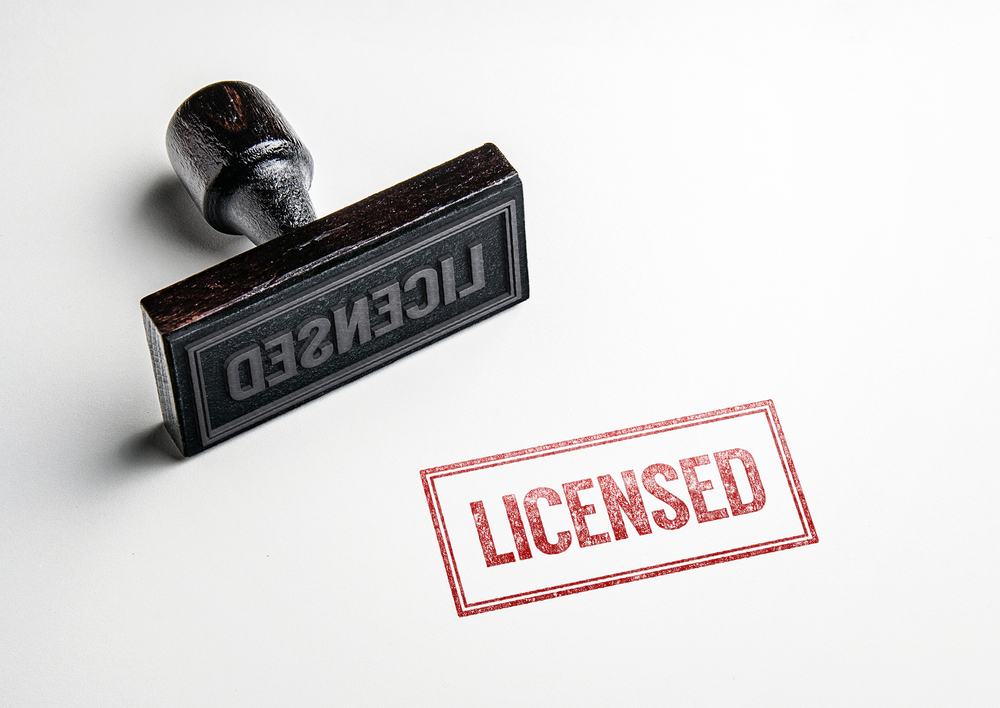
You are considering becoming a professional travel agent, so you start doing your research on all the things you need to start selling travel. One of the things you may research or come across is licensing. Do you need licensing to start selling travel? The answer to that question is broken down below to hopefully provide you with the clarity you need to move forward.
Travel Agent Licensing Requirements For Travel Agents In The United States
The licensing requirements in the US for travel agents is not much of a licensing process. There are no testing, training or qualification process needed. All that is required is to complete a simple form, pay a small fee and just like that, you can start selling travel in the USA. There are certain states however that have their individual "Seller Of Travel Requirements." These states are California, Florida, Iowa, Washington and Hawaii. We will look at the individual licensing requirements for those later on in this article for those looking to trade in travel products and services in any of those 5 states.
Travel Agent Licensing Requirements For Travel Agents In Canada
Selling travel legally in Canada is not so easy as in the US. This is especially so for those living in the province of Ontario. Anyone selling travel products and services in the Province of Ontario must be a registered member of the Travel Industry Council Of Ontario (TICO) or affiliated with a registered member of TICO. There are two different types of TICO registration requirements. If you are looking to start your own travel agency, you must complete the TICO application, qualification, training and registration process to obtain a TICO registration number. If you are looking to simply sell travel, you must first complete the TICO Exam then join a TICO registered travel agency.
So here are the requirements for Travel Agents and Agencies In Ontario
A) Travel Agency must be TICO registered with a TICO number to employ or host travel agents.
B) All members of that Travel Agency, selling or giving advice for travel services, must complete the TICO Exam.
To write the TICO Exam, you must first download and read the TICO education standard manual. This manual provides you with a list of rules, guidelines and etiquette you must follow when selling travel in the province of Ontario. Once you have completed the manual, which should take no longer than one to two weeks, you then need to register for exam at one of the approved centers. You can find a list of upcoming exams on the ACTA (Association Of Canadian Travel Agents) website. The course registration fee is only $35, and there are a few courses you can take. You can either take the Travel Counselors course of if you have and can show experience in the industry you can take the travel manager/supervisor course. The combined courses will cost you $50.
To run your own TICO registered travel agency is not as easy and cost friendly as completing the exam to sell travel through an agency that is already certified. If you are thinking of starting your own TICO registered travel agency, here are the list of requirements:
- You will need to come up with an application fee of $3000 CDN
- You must provide your tax returns to show proof of financial stability
- You will need to show evidence of a minimum $5000 in working capital
- You will need to provide a $10,000 bond that TICO will hold for two years
- You will need to open a trust account where all funds you collect for travel must be held.
- You will need to register your travel business with Service Ontario
TICO registration numbers are non-transferable, so there are no options to buy out an already existing TICO certified travel agency. Starting a travel agency in the province of Ontario is among the hardest if not the hardest in the industry, so if you are new to the business and you are living in Ontario, the easiest thing to do is work through a host agency that is already TICO certified.
British Colombia Travel Agency Licensing Requirements
To start a travel agency in British Columbia, Canada, you are required by the Insurance Council of British Colombian to take a travel insurance exam for a fee of $225 per year. That licensing will be tied to the Agency, and each agent will be required to take the exam once, and then maintain by taking a 2-hour course each year. A 2-year lapse or non-activity will require the agency to start the process all over again.
There are some additional fees and certification requirements for sellers of travel residing in British Columbia.
- You must register with the BC Corporate Registry
- You must register with Consumer Protection BC
If you are a hosted agent working under an Agency located in BC, you will need to apply for a branch location of your host agency in British Columbia.
Saskatchewan Colombia Travel Agency Licensing Requirements
Similarly to British Colombia, getting licensed to sell travel in Saskatchewan Canada is insurance based. The tow exams that’s required to be written and passed are the General Insurance Council of Saskatchewan (GICS)—the Qualifying Exam (online: $109 CAD + taxes) and the Travel Bylaw Exam (online: $55 CAD + taxes). The bylaw exam is an open book exam, so you do not need to worry too much about passing it.
US Travel Agency Licensing Requirements Per State
Even though getting your travel business up and running on the national level in the United States is pretty much hassle free, some states have implemented their own registration procedures that may make things a little bit more complicated. 5 States have their own Seller of Travel laws in place. Those states are California, Florida, Washington, Iowa, and Hawaii. These laws are what is called extraterritorial laws that do not just apply to those residing in the above-mentioned states, but those outside of the states selling travel to the residents of those states.
In the State of Delaware, if you plan on opening your travel agency there, you will need an occupational license that can be obtained for the nominal fee of $25. The same procedure is said to be in Lousiana but does not seem to be enforced. When it comes to Seller Of Travel licensing requirements, Louisiana and Delaware are hardly mentioned. It is the 5 primary states mentioned above that is worth paying close attention to.
Hawaii Seller Of Travel Requirements
Hawaii Seller of travel laws states that anyone acting as an intermediary between a person looking to buy travel products and services, and anyone that wishes sell travel products and services, must first register with the Hawaii Travel Agent Licensing Program. All travel agencies, chartered tour operators residing in Hawaii is required to register at the end of each odd-numbered year. The bi-annual registration fee is $140. For those living outside of the State of Hawaii but wish to do business in Hawaii, must apply for a Certificate of Authority to sell trade in travel products and services in the state of Hawaii. The registration cost is $25 per year. For full details of these and other requirements, contact the Department of Commerce and Consumer Affairs.
California Seller Of Travel Requirements
Anyone that sells, offers consultation, or offers travel products and travel-related services in the state of California or from n office located in California, is required to be registered as a California Seller Of Travel. This is also including anyone selling or distributing travel certificates, a coupon, vouchers, passes, are all required to comply with the California State Seller Of Travel Laws. Failing to register may result in penalties, a cease and desist order and the possibility of criminal charges.
There are two registration programs for travel businesses located in California. Once is the Travel Consumer Restitution Corporation which manages the handling of customer funds and the other is the California Seller Of Travel Program (CST) that is administered and upheld by the California Attorney General. Out of state agencies are only required to register for the CST. The California seller of travel law is strictly enforced and travel agencies conducting business are required to display their CST number on any marketing material promoting of offering travel services in the State of California.
Florida Seller Of Travel Requirements
In the sate of Florida, anyone seeking to sell travel products or travel related services must register with the Department of Agriculture of Consumer Services. The Seller Of Travel registration requirements applies to all persons offering pre-arranged travel packages, tourist related services, guided tours for Land, Air and Sea.
The state requires a bond of $50,000 and extensive disclosures in order to obtain a Seller Of Travel license. Independent travel agents are not required to post the bond but must meet the other mandatory requirements.
Iowa Seller of Travel Requirements
It is a requirement in the state of Iowa that all sellers of travel register with the department of Economic Development. This applies to anyone selling or offer consultation for travel products and travel-related services.
Washington Seller Of Travel Requirements
The State of Washington has a seller of travel registration requirement done through the Department of Licensing. There are also certain financial requirements and securities that needs to be in place. A travel business can become exempt from these fees is certain business standards are met and funds and consumer funds collected for travel are being held properly.
When looking to get licensing to sell travel, the best thing to do is thoroughly research the laws in your local area. This is another place where the value of a Host Agency comes in. By contacting a host agency, they will not only be able to save you time and money of the licensing and registration process; they will be able to provide you with a lot of the information you are looking for.
- Privacy Policy
All Rights Reserved The Travelnet Inc.

Tourist Guiding
Tourist guiding is a critical component of the tourism value chain. They play an essential role in ensuring repeat tourist visitation to South Africa through creating memorable experiences and subsequently, a positive image of our country. For more information on tourist guiding, click on the links below:
- Information on becoming a tourist guide
- Finding a registered tourist guide in South Africa
- Tourist Guide Language Training
- Online Lecture Series for tourist guides
- Business information (tax compliance, business registration and contract management etc)
- Various domestic topics including stargazing, natural wonders, history and geological heritage
- World Federation of Tourist Guide Association
For assistance, please email: [email protected]

National Registrar of Tourist Guides Ms Mmaditonki Setwaba Telephone: +27 (0) 12 444 6312/6311 E-mail: [email protected]
_____________________________________________________________
- Tourism Celebrates the Tourist Guiding Profession in the Northern Cape Province
THEME COLOR
- [email protected]
- Registration
- Licensed Tourism Entities
- Press Release
- Graded Entities
NATIONAL GUIDELINES FOR COMMUNITY-BASED TOURISM ENTERPRISES (CBTEs) IN RWANDA
Rwanda Tourism Policy
Rwanda Wildlife Policy
Rwanda Protected Areas Concessions Management Policy
Rwanda Competition & consumer protection policy
Tourism Law
Consumer Protection & competition Law
Companies Law
Investment Promotion Law (Investment code)
Building code
MINISTERIAL ORDERS
Ministerial order determining conditions for occupational health and safety
Ministerial order on tourism entities licensing and grading
SELF-EVALUATION FORMS
Lodge or Tented Camp
Restaurant, Bar or Nightclub
Tour Operator
Tourism Information Centre
Town Hotel, Vacation Hotel, Villa, Cottage, Serviced Apartment or Motel
Travel Agent
DOCUMENT CHECKLISTS
Travel Agent
East African Community: Classification sheet for Town Hotels
East African Community: Assessment sheet for Town Hotels
Health Certificates Checklist
INTERPRETATION OF REQUIREMENTS
Inspection checklist.
Restaurants, bars and nightclubs
TRAINING FORMS
Fire Safety
Food Handling
Internet Requirements
List of tourism and hospitality schools in Rwanda
User Manual
The tourism regulation website is a portal under the Customer Care & Regulatory Division in RDB with a mission to regulate the tourism industry in Rwanda.

Our Contacts
Latest tweets.
Modal title

Tourism Registration
As the official marketing body for Mpumalanga, Mpumalanga Tourism and Parks Agency (MTPA) offers a wide variety of services to the tourism industry and potential visitors. These services include providing as much information on what there is to do, see and visit in our beautiful province, as well as where to stay. It is also our responsibility to ensure that the visitors have an enjoyable experience. In order to achieve these - and other objectives, It is in the interests of the province to have reliable sector information. One way of achieving this objective is through an efficient registration system of all tourism enterprises and services in the province. The tourism industry is very much competitive and requires well differentiated, innovative and reliable high-quality information on the size of the tourism industry, the numbers of participants and capacity of the sector etc. Lack of information may inhibit the sector’s ability to innovate, deliver appropriate services and products and identify and target gaps in the market. Further, this may impede service providers’ ability to effectively evaluate business opportunities and risks. Registration will enable us to gain a meaningful understanding of the tourism sector in the province and allow the province to better assist tourism businesses where there is a need and elevate their capacity to further grow the tourism sector. Again the registration may assist the province to enhance the quality and standards of tourism products and services, level the playing field and prevent rouge operators across the tourism sector in the province. This means that, as a tourism stakeholder who registers with MTPA, you will receive free exposure through our marketing and promotional campaigns, as well as a free listing on our website (www.mpumalanga.com), which is growing in both content as well as visitors. We will also be adding to the list of benefits that registrants can expect to receive from MTPA as we progress. Whilst regulations have been promulgated making it compulsory to register with MTPA, registration will be operating on a voluntary basis for the immediate future.
MTPA on Instagram
Everything You Need to Know to Start a Tourism Business In South Africa
Updated on 30 June 2018
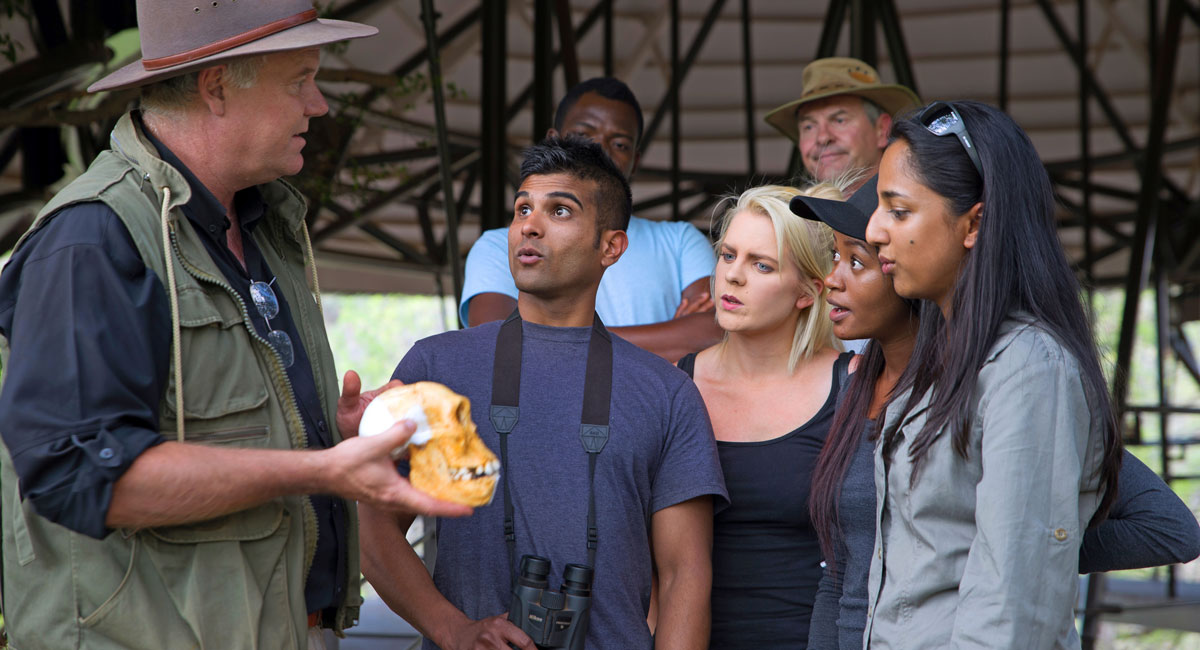
It’s important to adhere to the regulations of your selected industry, should you open a business. It’s the same for a tourism business.
An establishment which does not hold the required documentation like a business license, a certificate of acceptability or a liquor license, is committing an offence under the applicable law in South Africa. The offence may be punishable by way of a fine and/or imprisonment.
We look at what requirements you will need to meet if you want to open a restaurant, lodge, bed and breakfast or operating any other tourism-related business in South Africa.
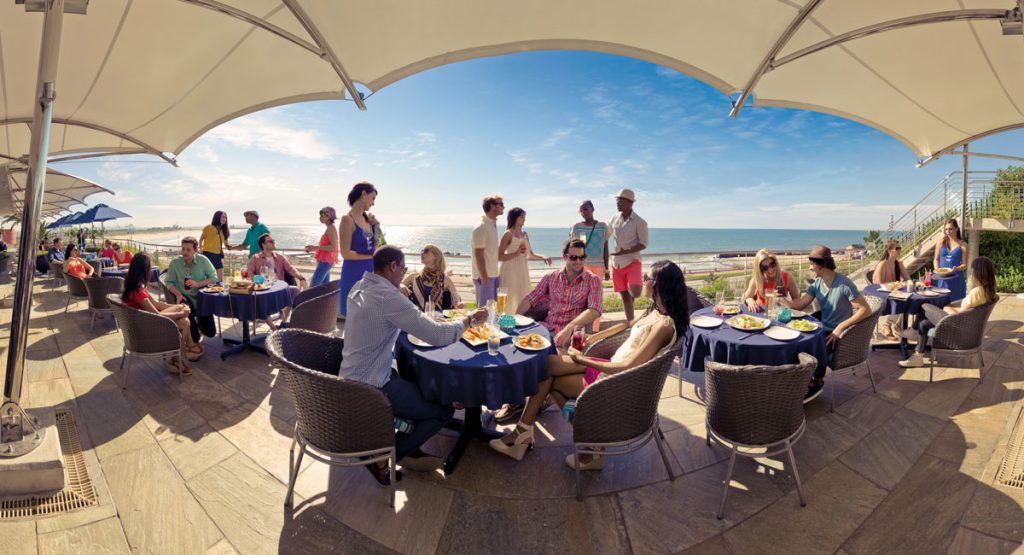
Restaurants, Lodges, Bed and Breakfasts, or Taverns
If you aim to produce, store, distribute, prepare, transport or sell any kind of foods intended for public consumption then you must apply for a business trading licence. It is advised that you contact your local municipality because the requirements for a business license may differ from one local municipality to the next.
You’ll need the following for the business license application:
- A Land Use Clearance Certificate. (You need to identify the zoning to your property, find out what category your property’s zoning falls into and what development rules apply to you. Depending on the scale of your development, you may be required to schedule a pre-submission meeting with your local planning office.)
- A Population and Clearance Certificate is obtained after a fire inspection.
- A copy of an approved building plan of the interior of the premises.
- A Certificate of Occupancy.
- An application for Certificate of Acceptability.
- A Liquor License (if you want to sell liquor on premises)
- A certified copy of the business owner’s ID
- A certified copy of the managing director or main staff member’s ID
- Apply for your establishment’s site inspection from the Department of Health. Inspection is done by Health and Safety Inspectors.

Level Up Your Establishment
The Tourism Grading Council of South Africa (TGCSA) has an international accepted Star Grading system to indicate levels of quality, comfort and service at the establishments they assess. You apply for star grading after your business is in operation.
According to Darryl Erasmus, Chief Quality Assurance Officer at TGCSA, the star grading system allows us to position South Africa on a global platform as a quality destination.
You may apply online to get an internationally accepted Star Grading from the Tourism Grading Council of South Africa (TGSA) and have your establishment assessed. You apply online at www.tourismgrading.co.za, settle your account and an assessor will contact you. Once approved, you’ll receive a Grading Certificate and a Grading plaque.
On the website, when applying, choose one of 11 categories to identify your tourism business, namely:
- Bed and Breakfast
- Country House
- Self-Catering – Shared Facility
- Self-Catering – Exclusive Facility
- Hostel or Backpacker
- Caravan and Camping Facility
- Meeting | Exhibition | Special Events Venue (MESE)
An establishment is assessed on the following:
- The exterior of the building and grounds
- Public Areas
- General Facilities
Fees for a Star Grading
The fee is calculated using the chosen category, the number of rooms the establishment has and the average daily rate of the property.
If you Cannot Afford the Grading Fee
The TGCSA in association with the National Department of Tourism offers grading support incentives which allow properties to get up to 90% off their annual grading fee. Visit the website www.tourismgrading.co.za to find out more.
Applying for Grading Support Initiatives
You need the following if you want to utilise the incentive discounts:
- A copy of a current and valid SARS Tax Clearance Certificate;
- A copy of relevant business registration documents i.e. company registration document (for CCs and Private Companies)/ Partnership Agreement (for Partnerships)/ Trust Deeds (for Trusts)/ Identification Document (for Sole Proprietors);
- A certified copy of your B-BBEE certificate or an affidavit in the case of Exempt Micro Enterprise (EME) or Qualifying Small Enterprise with more than 51% black shareholding); and
- A copy of public liability insurance documents.
Star Grading Levels
Each star grading level has a set of minimum criteria that are required to be met and found in place at the property.
Other Legal Requirements for Tour Businesses
To erect a road sign in the road reserve area to advertise your business, you need approval from:
- Department of Transport in the case of national roads;
- The Facility Signs Committee in the Provincial Department of Transport in the case of secondary roads;
- The Local Municipal Engineer in the case of local roads within a Local Municipality area.
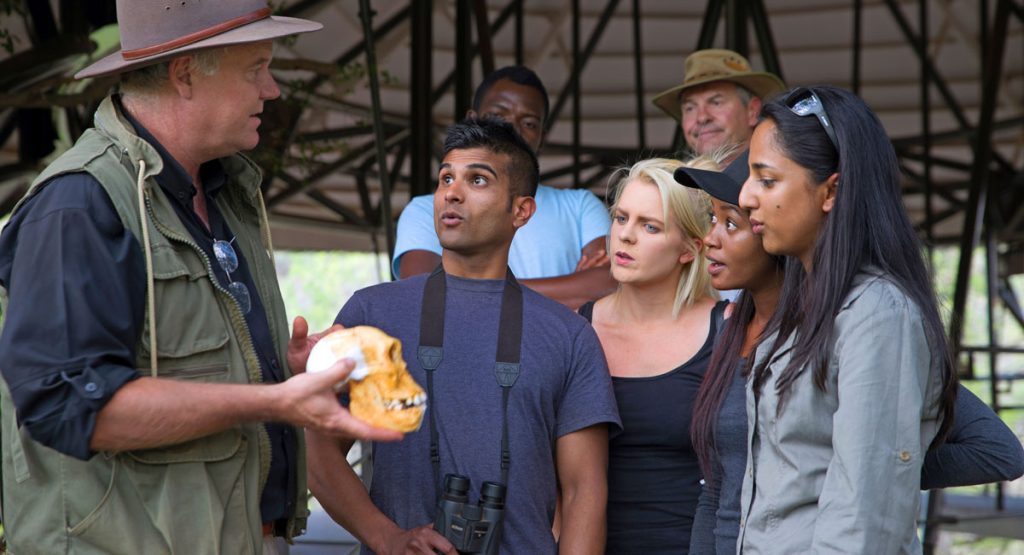
Transport and Tour Operators
To operate a transport business in the tourism sector:
- Apply for a Road Transportation Permit from the Department of Transport. The application must be made to the Local Transportation Board. You need to be clear on your application that you will be transporting tourists and mark clearly the route that will be used.
- Apply for Professional Drivers Permit. You need to have a valid driving licence according to the vehicle you are driving.
- Get a qualified tour guide to travel with tourists when they get to South Africa.
To trade as a:
A tour operator: this is someone who makes all the arrangements for the tourists. You should enroll with an institution that offers a tour operator course and affiliate with the Southern Africa Tourism Services Association.
A tour guide: this is someone who travels with the tourists from their place of arrival to all the places they would like to visit in South Africa. A tour guide will apply at his or her provincial tourism office. Documents a tour guide needs to operate legally are:
- certificate of a first aid course
- a copy of your work permit if you are not a South African citizen
- certified copies of your qualifications
- current registration details of tourism associations you’re linked with
- a signed copy of a code of conduct (obtainable from the Provincial Registrar)
Sources: South African Tourism , Tourism Grading of South Africa , KZN Tourism and the Western Cape Goverment site.
Get Weekly 5-Minutes Business Advice
Subscribe to receive actionable business tips and resources.
RELATED ARTICLES
Youth Entrepreneurial Programmes in South Africa

Where to Find a Business for Sale

10 Cheapest Franchises in South Africa

National Youth Development Agency (NYDA) Business Funding Success Stories

Feeling Stuck?

- [email protected]
- www.smesouthafrica.co.za
- Advertise with Us
- Apply For Funding
Copyright ©2024 | SME South Africa | Designed and Developed by Adclickafrica
TERMS & CONDITIONS | PRIVACY POLICY
Find Expert Answers
Add sme south africa to your homescreen.
- How The BTB Works
- Minister of Tourism
- Board of Directors
- Executive Management Team
- Marketing & Communications
- Industry Development
- Cruise & Capacity Development
- Registrar Unit
- Administration and Human Resources
- Finance Department
- Strategic Plan 2019 – 2022
- Corporate Responsibility
- Committee Relations
- Travel Publications
- Sargassum Resource
- Tourism Asset Inventory
- AirBnB Resource
- Belize Drone Requirements
- Travel Trade Shows
- Vacancy Application Form
- Press Releases
- Media Gallery
- Media Requests
- Marketing Beat Newsletter
- Tour Operator
- Luxury Tourism: Private Aviation
- Nautical Tourism
- Tourism Development Plans
- Useful Links
- Belize Tourism History
- Retirement Program
- Tour Operator Insurance Support Program
- Tourism and Health Program
- Belize Earth Day: A Creatively Green Pop-Up!
- Industry Conference
- Digital Marketing Summit
- Taste of Belize
- Belize International Music and Food Festival 2.0
- National Tourism Awards
- Tour Guide Training
- Online Portal FAQ’s
Industry Sector's Licensing Process

A United Belize Tourism Industry…
The Belize tourism industry is the fastest growing private sector with the greatest contribution to Belize’s annual GDP growth. The guidance and governance of policies help to sustain support and enhance the industry.
This strategic focus ensures that the industry sectors can sustainably meet the demands of a growing tourist destination.
We know that every second counts when it comes to achieving excellent visitor experiences. With this in mind, we have made the process of applying, renewing, licensing and becoming qualified easier with categorized downloadable forms.
Click below to learn more.
Keeping up-to-date with licensing and registration, made easy…
The Belize Tourism Board (BTB) understands the critical role that the accommodations sector plays in providing overnight travellers to Belize with unmatched Belizean hospitality and comfort.
Tour Operators
Providing visitors with an unforgettable vacationing experience.
Tour Operators are a pillar sector of the Tourism Industry, providing tour services countrywide. These businesses must be licensed to conduct their operations. For renewing and applying for a Tour Operator license kindly download the form provided below.
Tour Guides are an essential part of Belize’s tourism industry. They undergo rigorous trainings and examinations, for certification through the Belize Tourism Board (BTB) licenses.

Tourism License Requirements in Kenya
These are the requirements one must meet in Kenya in order to be issued with a tourism license in Kenya. This license is issued by the Tourism Regulatory Authority (TRA) to ensure that necessary regulations, standards and guidelines are followed in the tourism sector. Below are different classes of services that require a tourism license in Kenya.
- Accommodation facilities
- Restaurants
- Food and Beverage service providers
- Tour operators
- Travel agencies
- Balloon operators
- Local Air Charters
- Tourist Service Vehicle HirE
- Water Sports and Boat Excursions providers
- Game fishing outfitters
- Enterprises offering camps and camping equipment for hire
- Nature parks
- Nature reserves
- Nature trails
- Game ranches
- Amusement parks
- Non-citizen tour leaders/guides
- General vendors and beach operators
- Entertainment facilities
- Conference and events services)
- Tourism and hospitality training institutions
The above services are divided into various classes which we have highlighted below. You must meet the requirements below before making an application for a Tourism License.
Class A Requirements i.e Enterprises (Accommodation Facilities)
1.Certificate of registration / Incorporation of company
2.Memorandum and Articles of Association of company
3.Copy of menu and tariff where applicable
4.Copy of the current health clearance certificate ( less than three months old)
5.Medical Certificate of food handlers
6.CV and professional certificates of the Manager
7.Manager’s letter of appointment
8.Entry permit for all non- Kenyans working in the facility and affidavit for non-resident director(s)
9.Lease agreement/ copy of title deed of premises occupied by the hotel
10.Letter of ‘no objection’ from NEMA
11.EIA for new facilities / environmental audit for existing facilities
12.Compliance to tourism or area development plans
13. Evidence of insurance cover for the premises
14.Duly filled in application Form ; Download it here
15. Filled in application forms HR1 and HR2 ; Download here
License Fees
License fee depends on the class of the hotel i.e
Application fees : Ksh 1000
3. Ksh 16,000 Licence fees for hotel with or without at least one restaurant and/or bed capacity of between I I to 40 beds and minimum total charge for accommodation per night is over Kshs. 1.500.
4. Ksh 21,000 Licence fees for a hotel with more than one restaurant and bar outlets and/or bed capacity of between 41 to 80 beds in addition to function room facility.
Villa License Fee : Ksh 27,000
The fees are payable to KCB bank; University Way branch, Account name; Tourism Regulatory Authority, account number; 1178921034.
Class ‘B’ Enterprises ( Restaurants and other food and beverage services)
3.Copy of menu
8.Entry permit for all non- Kenyan employees and affidavit for non-resident director(s)
13.Evidence of insurance cover for the premises
14. Duly filled in application Form ; Download it here
License Fees : Ksh 1,000
Class ‘C’ Enterprises (Tour Operators, Travel Agencies,Balloon Operators, Local Air Charters, Tourist Service Vehicle Hire, Water Sports and Boat Excursions)
1.Copy of lease agreement/ title deed of premises
2.Certificate of registration of company (new applicants)
3.Memorandum and articles of Association (new applicants)
4.Work/ entry permit for non- Kenyans involved in the business and copies of affidavit for non- resident director(s)
5.Copy of insurance cover where applicable
6.Proof of ownership of vehicle or letter of contract of hire and vehicle inspection report in the case of tour operators and tourist service vehicle hire
7.CV, professional certificates in ticketing and proficiency in airline reservation systems in case of travel agencies
8.Certificates of airworthiness and seaworthiness where applicable
9.Copy of itinerary in case of tour operators
10.Professional certificates
11.Copy of pilot licenses indicating their flying hours and air charter license from Kenya Civil Aviation Authority (KCAA) in the case of air charter operators
12. Duly filled in application Form ; Download it here
The license fee for this class is Ksh 9,000.
Class ‘D’ Enterprises
(Game fishing outfitters, enterprises offering camps and camping equipment for hire, nature parks, nature reserves, nature trails, game ranches, amusement parks, non-citizen tour leaders/guides)
5.Letter of ‘no objection’ from NEMA
6.EIA for new facilities / environmental audit for existing facilities
7.Compliance to tourism or area development plans
8.Evidence of insurance cover for the premises
9.Current certificate of good conduct, letter of reference, professional certificates and copy of current entry permit and passport in case of non-citizen tour leaders/guides
10. Duly filled in application Form ; Download it here
License Fees
The license fee for this class is Ksh 6,000.
Class ‘E’ Enterprises
(Local traditional boat operators, professional safari photographers, curio vendors, private zoos, citizen tour leaders/guides, general vendors and beach operators)
1.Current certificate of good conduct, letter of reference, professional certificates and copy of ID in case of citizen tour leaders/guides
2.Clearance certificate from Kenya Maritime Authority in the case of local traditional boat operators
3.Copy of permit / license from the film department, entry permit/ID card/ in case of professional safari photographers
4.Copy of ID and current certificate of good conduct in the case of curio vendors and beach operators
5. EIA/ environmental audit, approval by NEMA and clearance from the KWS in the case of private zoos
6. Duly filled in application Form ; Download it here
Tour driver – Ksh 2,500
Professional safari photographer- Ksh 2,500
Tour leader – Ksh 7,000
Curio Shops – Ksh 2,500
Local traditional boat operators – Ksh 2,500
Travel Bureau – Ksh 2,500
Private Zoos – Ksh 2,500
Tourism Regulatory Authority (TRA) Contacts
Tourism Regulatory Authority, Utalii House,5th Floor, Utalii Lane, off Uhuru Highway. P.O. Box 30027, Nairobi, KENYA Telephone:+254 0701-444777 Email: [email protected] Website: http://www.tourismauthority.go.ke
Victor Matara
I help you to save time and live more with the most up-to-date lists, guides, reviews, and advice.
Related Posts

Grogan Castle Hotel Taveta: A Palace in the Wilderness

List Of Top 10 Best Hotels In Turkana County

Some Of The Cheapest Towns To Live In Kenya

How To Pay For Parking In Nairobi Via Mpesa

List Of 10 Best Places To Visit In Siaya County
Chebloch Gorge: Elgeyo Marakwet’s Hidden Treasure

IMAGES
COMMENTS
must submit a completed and signed registration form and the code of conduct and ethics upon registration. Tourist Guide Registrars The National Registrar of Tourist Guides, in conjunction with the Provincial Registrars, facilitate maintenance of the Central Tourist Guides Register as well as the registration of Tourist Guides at provincial level.
The tourism industry is flourishing, with millions of people around the world seeking unique travel experiences. By tapping into this demand, you have the opportunity to not only fulfill the desires of adventurous travelers but also contribute to the local economy. ... The specific registration requirements and process may vary depending on ...
6 min.As a member of the tourism industry, whether you're a tour operator or a travel agent, you may be wondering how you can grow your network, find new clients or partners, and stay up-to-date on trends. Tourism industry associations offer a myriad of benefits to professionals and companies in the hospitality and tourism sector. […]
The legal structure you choose for your tour operator business will shape your taxes, personal liability, and business registration requirements, so choose wisely. Here are the main options: ... The tourism industry has bounced back in a big way since the pandemic, so now could be a great time to start a tour operator business. ...
Get ready to embark on an entrepreneurial journey and learn how to start your tourism business, one step at a time. 1. Start with Market Research. Market research assists tourism businesses in pinpointing their target audiences. | Photo Source. Conduct thorough market research to identify your target audience, competition, and potential niches ...
With your research complete, now is a good time to consider your options for registering your business. Go to your local tourism board and find out the requirements for starting a tour company in your area. Here are some of the legalities you might have to go through. Name your tour business. The first thing you need to do is name your business.
The tourism industry, much like an uncharted terrain, necessitates a thorough exploration. Having a comprehensive game plan will prevent you from losing your bearings amid the wilderness. So, fasten your seatbelts and put on your thinking caps; it's time to traverse the exciting topography of creating a successful tourism business.
Travel Law describes the nexus of federal, state, common law and international laws that regulate the day-to-day workings of the travel industry. The need for a body of law specific to the travel industry became evident with the deregulation of the travel industry that occurred in the 1970s. When the federally-mandated deregulation process was ...
Negotiating penalties with government agencies. Staying in compliance with the rules and regulations set for the travel industry is vital to your business. From seller of travel laws to advertising rules, the travel industry lawyers at Ment Law Group LLC are here to help you. Contact our attorneys today. (860) 969-3202.
Well, good luck to those who thought that the startup ecosystem is just a bubble waiting to burst. In fact, the travel and tourism industry will be adding $11,512.9 billion* to global GDP by 2027. So, everyone in the travel startup space is looking to share a part of the pie. (*As per a 2017 report by the World Travel And Tourism Council)
Registration Certificate and Articles of Incorporation and its By-Laws If Cooperative, Articles of Cooperation ... issued by Maritime Industry Authority (MARINA) Valid CPC and/or Provisional Authority from MARINA (if expired or for newly ... General requirements only General requirements only Tourism Training Center List of Training Programs ...
The permits and licences you need to run a tourism business in Queensland will depend on the services you offer (e.g. transport, accommodation, meals) and whereabouts you offer them (e.g. Great Barrier Reef or K'gari (formerly Fraser Island)). There are local, state and Australian government laws that apply to trade and business activities and ...
If you are thinking of starting your own TICO registered travel agency, here are the list of requirements: - You will need to come up with an application fee of $3000 CDN. - You must provide your tax returns to show proof of financial stability. - You will need to show evidence of a minimum $5000 in working capital.
State, territory and local governments manage the licences and permits for the tourism industry. The approvals you may need include: registration for travel agents. registration for tour operators. registration for accommodation providers. registration of a caravan park. fishing and boating licencing (see our Fisheries industry fact sheet)
Tourist guiding is a critical component of the tourism value chain. They play an essential role in ensuring repeat tourist visitation to South Africa through creating memorable experiences and subsequently, a positive image of our country. For more information on tourist guiding, click on the links below: . Tourism Celebrates the Tourist ...
Basic Registration Not Applicable Re ular Accreditation Premium Accreditaion Valid Mayor's permit and/or Business License Valid Comprehensive Genera Valid Comprehensive General Liability Insurance Policy Liability Insurance Policy (Minimum (Minimum amount of amount of coverage — coverage — P 500,000.00) Concerned employees must have
Our Contacts RDB Building 1 KG 9 Ave, Kigali P.O. Box 6239 Kigali, Rwanda Tel (Local): 1415 Tel (International): +250 727775170 Email: [email protected]
The Hotel, Restaurant & Tourism Management program offers exam prep courses that enhance student learning outcomes and provide students the opportunity to earn credentials recognized in the hospitality and tourism industry. Hotel, Restaurant & Tourism Management majors and HRTM minors prepare for these certification exams by taking the courses ...
As a travel agent, you cannot deduct or reclaim VAT on supplies made to you. However, you will be only taxed on the profit margin that you make on the travel package supplied to your client. A travel agent charges EUR 2000 to a client for a four-day trip. The total amount that the tour operator is charged EUR 1500 for various services (hotel ...
The tourism industry is very much competitive and requires well differentiated, innovative and reliable high-quality information on the size of the tourism industry, the numbers of participants and capacity of the sector etc. Lack of information may inhibit the sector's ability to innovate, deliver appropriate services and products and ...
A copy of an approved building plan of the interior of the premises. A Certificate of Occupancy. An application for Certificate of Acceptability. A Liquor License (if you want to sell liquor on premises) A certified copy of the business owner's ID. A certified copy of the managing director or main staff member's ID.
Tour Guides are an essential part of Belize's tourism industry. They undergo rigorous trainings and examinations, for certification through the Belize Tourism Board (BTB) licenses. Learn More. A United Belize Tourism Industry…. The Belize tourism industry is the fastest growing private sector with the greatest contribution to Belize's ...
2.Clearance certificate from Kenya Maritime Authority in the case of local traditional boat operators. 3.Copy of permit / license from the film department, entry permit/ID card/ in case of professional safari photographers. 4.Copy of ID and current certificate of good conduct in the case of curio vendors and beach operators.